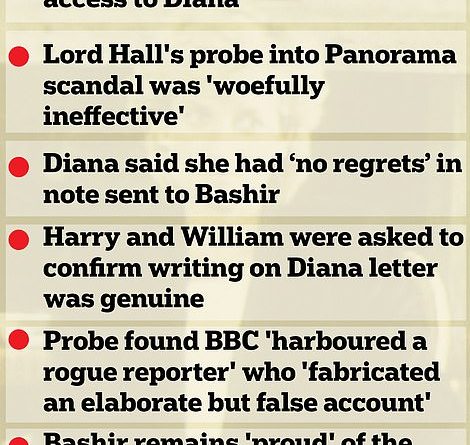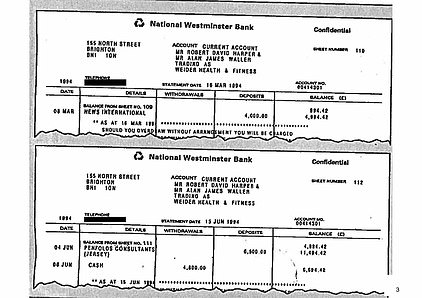Harry lashes out over ‘unethical’ BBC interview with Diana
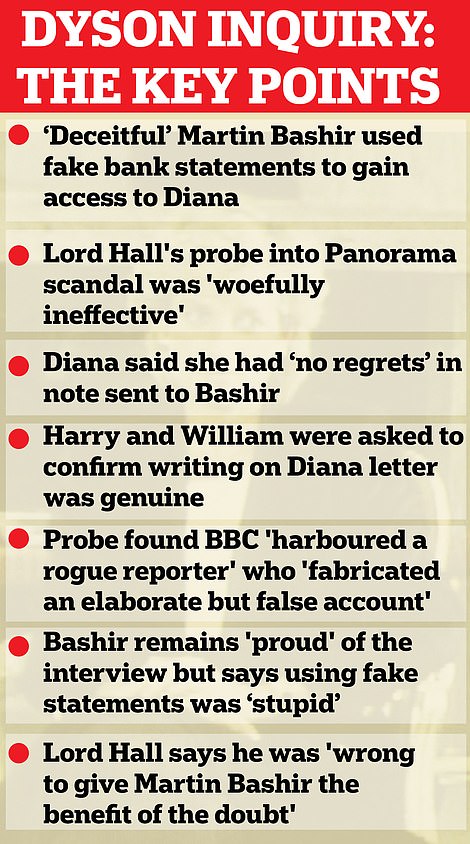
Key conclusions of yesterday’s bombshell report that brought shame on the BBC
Prince Harry blasted the 1995 BBC Panorama interview with Princess Diana as ‘unethical’ while furious William said Martin Bashir’s ‘lurid and false claims’ to secure it fuelled their mother’s ‘paranoia and isolation’.
The Duke of Cambridge said Bashir’s deceit in obtaining his 1995 interview with Princess Diana hastened his parents’ divorce and ‘hurt countless others’ in an unprecedented broadside against the shamed BBC.
His brother Prince Harry – who is based in California – also responded to judge Lord Dyson’s damning report into how the interview was obtained, saying his mother was ‘resilient, brave, and unquestionably honest’.
The Duke of Sussex thanked those who took ‘some form of accountability’ for ‘owning it’, but said ‘the ripple effect of a culture of exploitation and unethical practices ultimately took [Diana’s] life’.
In a statement last night, Prince William laid bare his ‘indescribable sadness’ that his precious final years with his mother had been marred by the isolation the historic Panorama interview caused.
What ‘saddens’ him the most was that should a 1996 investigation into claims Diana was hoodwinked by Bashir have been conducted ‘properly’, the princess would have known she was ‘deceived’ prior to her death in 1997, he claimed.
He said the interview now held ‘no legitimacy’, had established a ‘false narrative’ for 25 years, and the BBC’s failings had let his mother, his family and the public down.
The Duke of Cambridge read his bombshell statement to camera in a courtyard at Kensington Palace – his London residence and the home of his late mother.
Both William and the Duke of Sussex yesterday received ‘unconditional apology’ letters from the BBC over Bashir’s conduct and the subsequent cover-up now fully laid bare 25 years on.
Buckingham Palace and Prince Charles’ official residence Clarence House have also had correspondence, it can be revealed.
Appearing on a Panorama special about the scandal last night, the princess’s brother Earl Spencer linked his sister’s death to the BBC and the crisis of trust that engulfed her after she was deceived by Bashir.
His devastating verdict came as a judge ruled the shamed journalist hoodwinked the princess with an elaborate fiction that painted some of those closest to her as traitors.
The ‘rogue reporter’ commissioned fake bank statements to secure his interview with Princess Diana – but covered up his ‘deceitful behaviour’ in a ‘shocking blot’ on the BBC’s near 100-year history.
The statements wrongly suggested that Earl Spencer’s security boss was in the pay of tabloid journalists and a shadowy company linked to the security services.
His lies landed the Panorama reporter the interview of the century and multiple awards – but hastened the end of Diana’s marriage to Prince Charles and saw her stripped of her HRH status just two years before her death.
As the BBC suffered one of its darkest days, Lord Dyson’s report revealed:
- Earl Spencer led demands for Scotland Yard to launch a criminal investigation;
- Lord Dyson lambasted former BBC bosses for a cynical cover-up after The Mail on Sunday exposed the scandal in 1996;
- The broadcaster faced possible multi-million-pound payouts to victims of Bashir’s cruel smears;
- Culture Secretary Oliver Dowden threatened further ‘governance reforms’ at the BBC;
- The BBC is handing back all the awards the Panorama interview won, including a Bafta;
- Panorama broadcast its own exposé of itself – exposing BBC bosses’ failings.
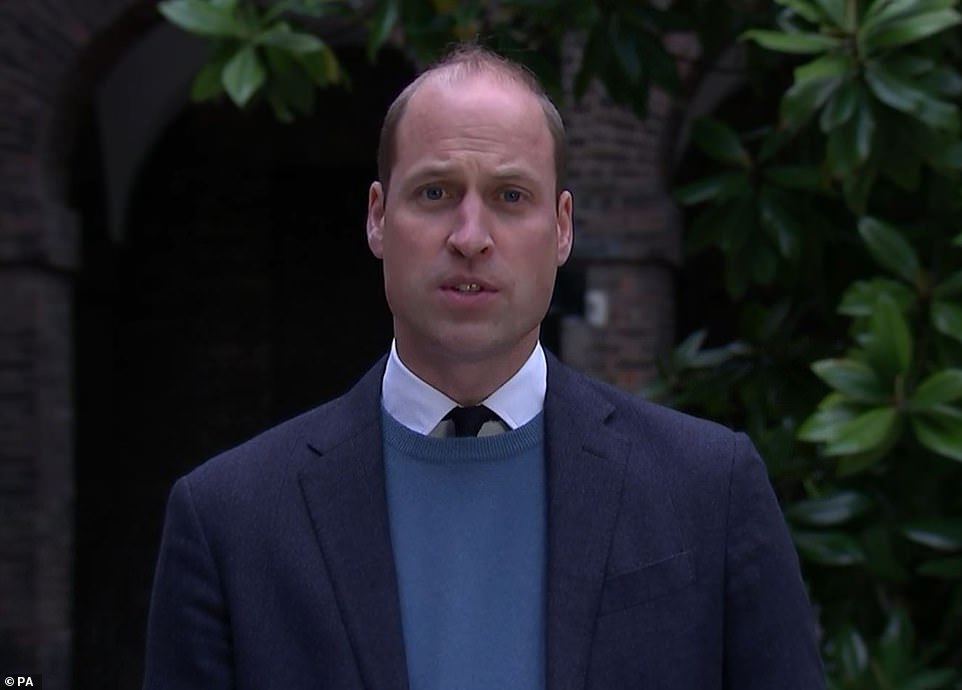
The Duke of Cambridge said Martin Bashir’s deceit in obtaining his 1995 interview with Princess Diana hastened his parents’ divorce and ‘hurt countless others’ in unprecedented broadside against the shamed BBC
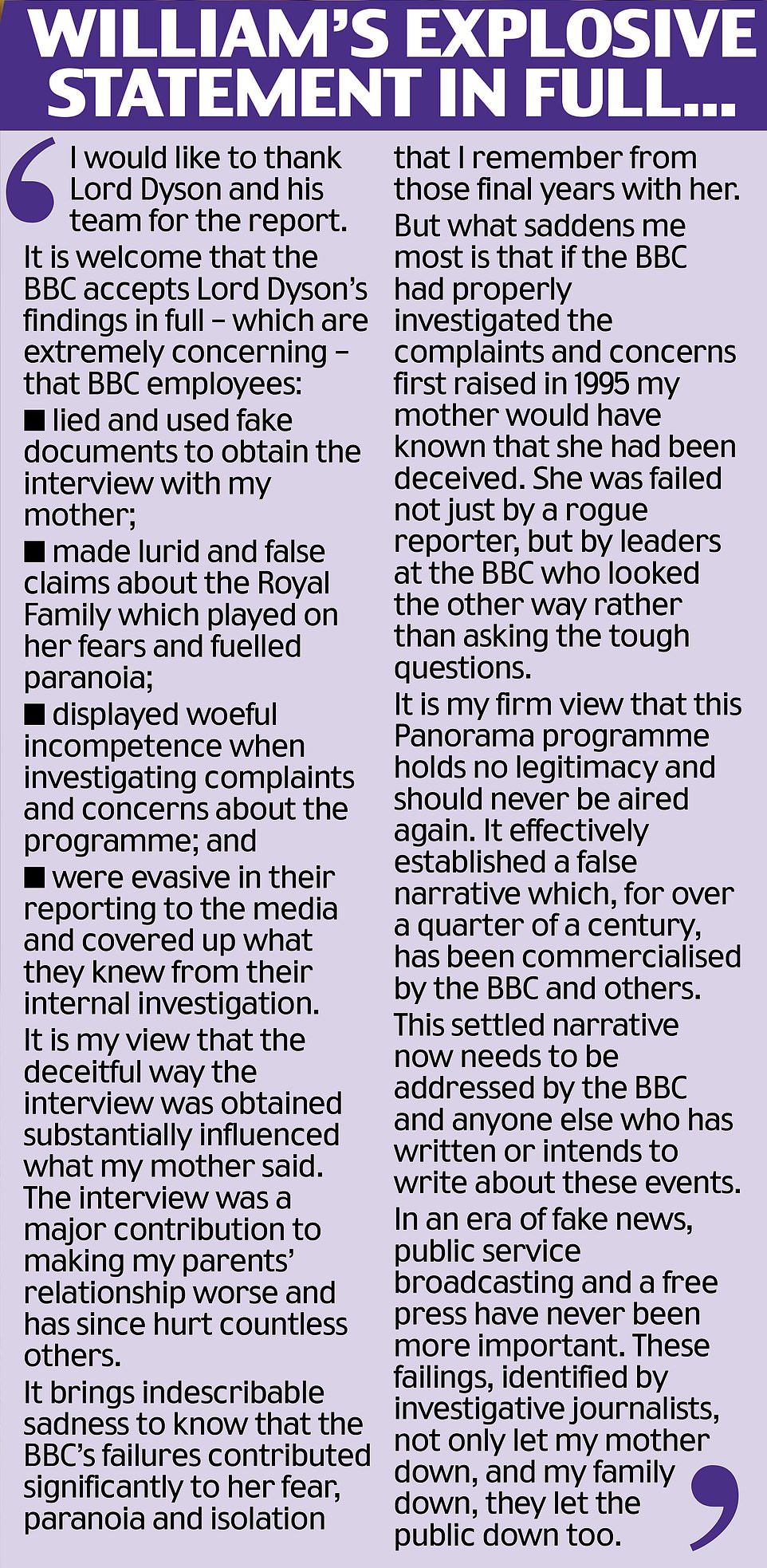
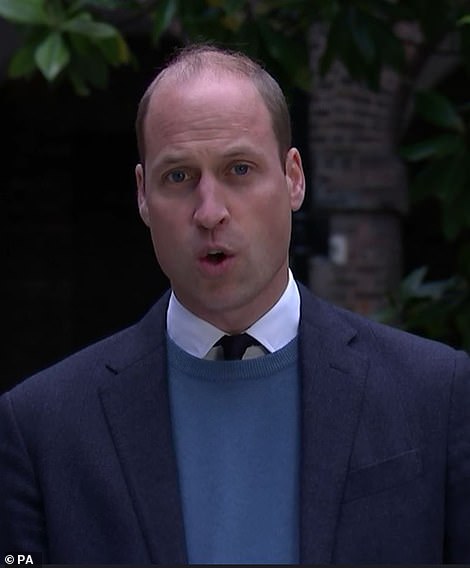
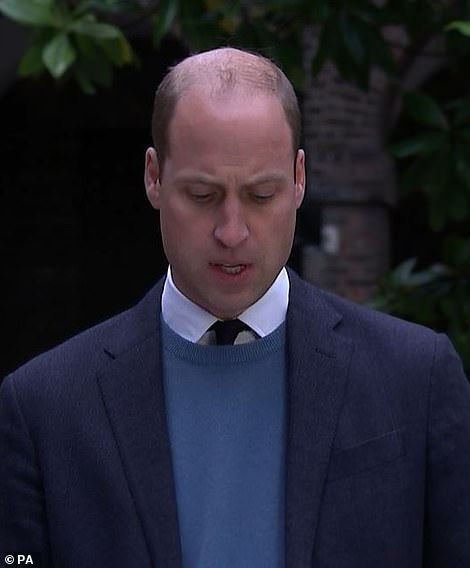
William (pictured) said what ‘saddens’ him the most is that should a 1996 investigation into claims Diana was hoodwinked by Bashir have been conducted ‘properly’, the princess would have known she was ‘deceived’ prior to her death in 1997. He said the programme should ‘never be aired again’ as it ‘established a false narrative which, for over a quarter of a century, has been commercialised by the BBC and others’
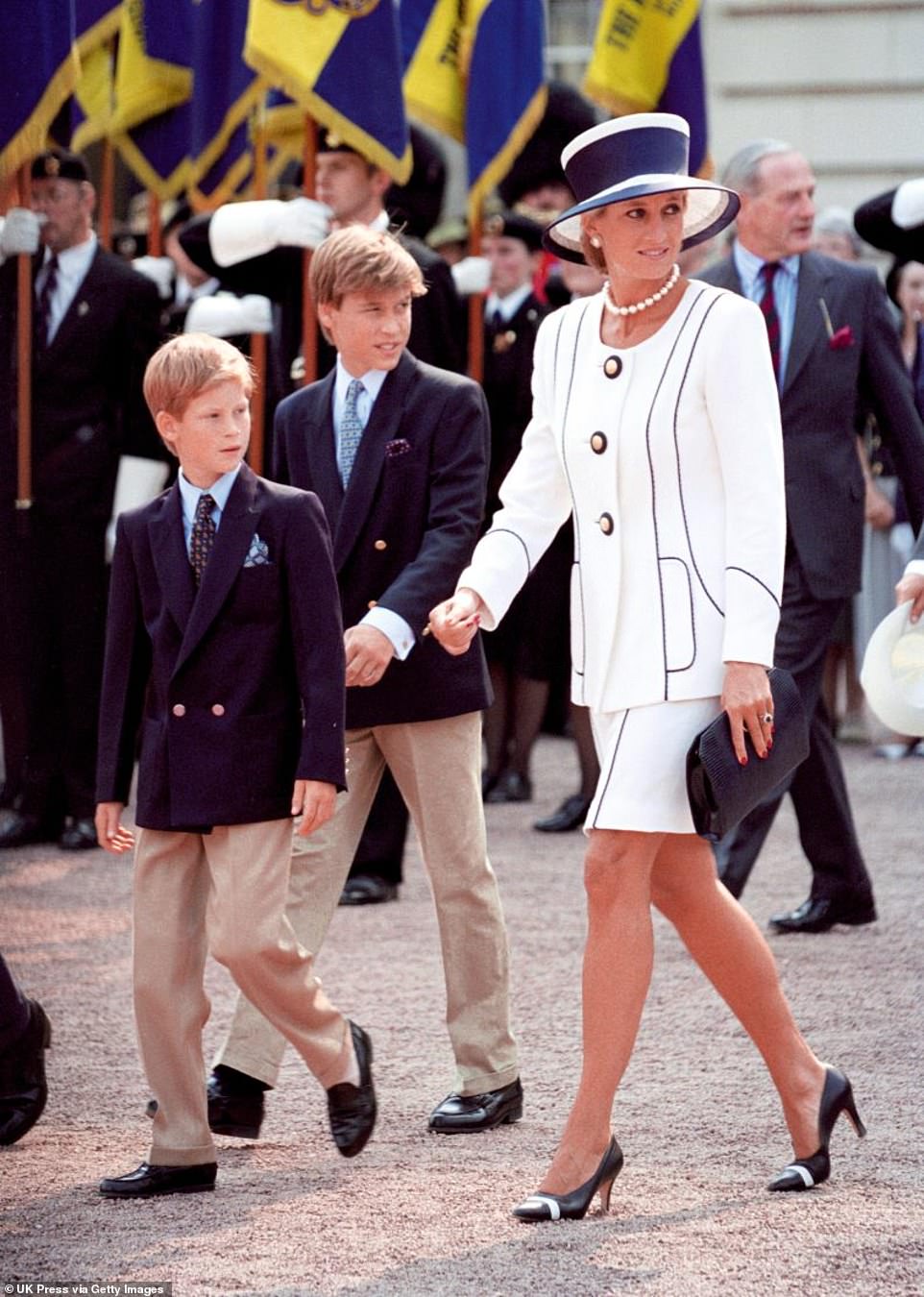
In a statement last night, Prince William told of his ‘indescribable sadness’ that the controversial Panorama interview increased his mother’s ‘fear, paranoia and isolation’ in her final years. Pictured: Diana with her sons
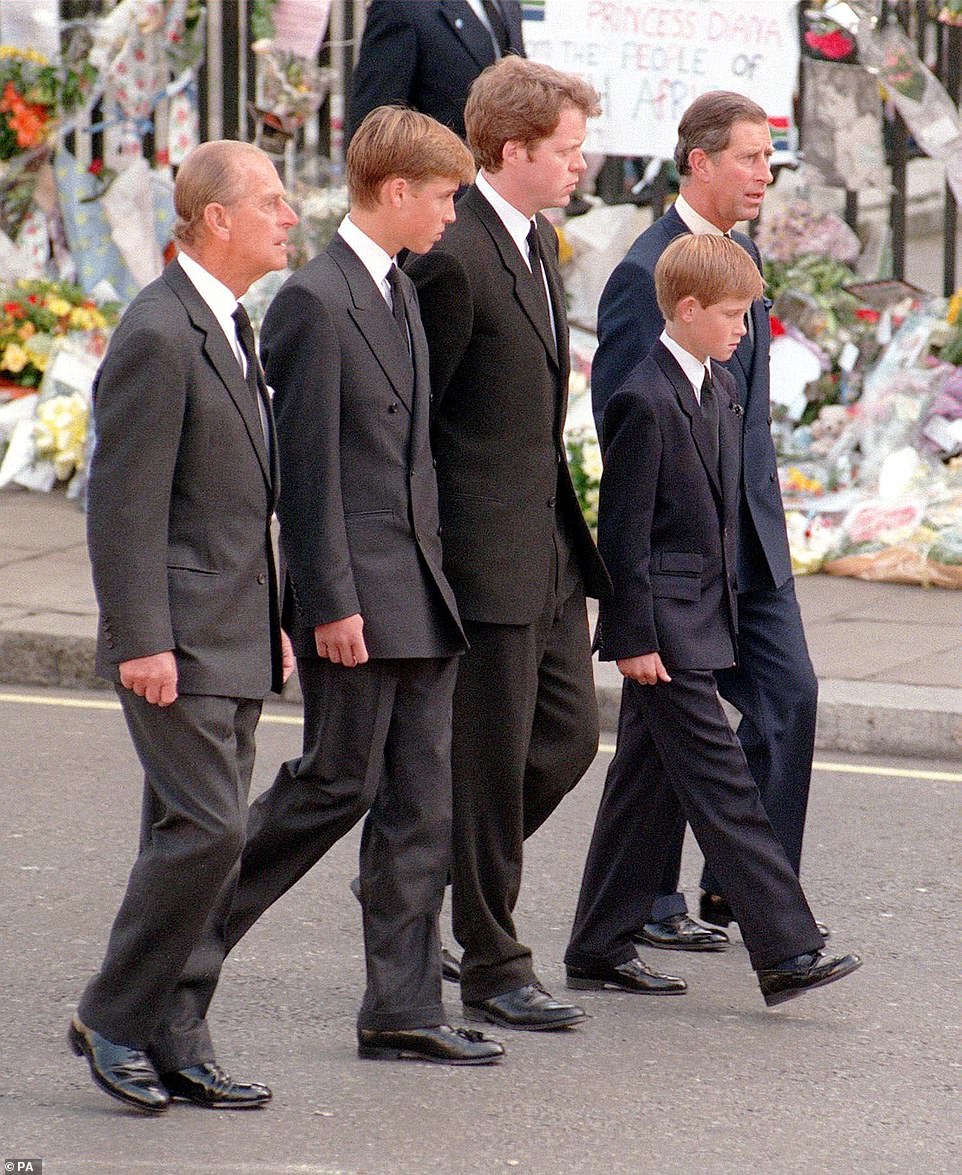
The Duke of Edinburgh, Prince William, Earl Spencer, Prince Harry and the Prince of Wales following the coffin of Diana in 1997

In a televised statement, Prince William said: ‘I would like to thank Lord Dyson and his team for the report.
‘It is welcome that the BBC accepts Lord Dyson’s findings in full – which are extremely concerning – that BBC employees: Lied and used fake documents to obtain the interview with my mother; Made lurid and false claims about the Royal Family which played on her fears and fuelled paranoia; Displayed woeful incompetence when investigating complaints and concerns about the programme; and were evasive in their reporting to the media and covered up what they knew from their internal investigation.
‘It is my view that the deceitful way the interview was obtained substantially influenced what my mother said. The interview was a major contribution to making my parents’ relationship worse and has since hurt countless others.
‘It brings indescribable sadness to know that the BBC’s failures contributed significantly to her fear, paranoia and isolation that I remember from those final years with her.
‘But what saddens me most, is that if the BBC had properly investigated the complaints and concerns first raised in 1995, my mother would have known that she had been deceived.
‘She was failed not just by a rogue reporter, but by leaders at the BBC who looked the other way rather than asking the tough questions.
‘It is my firm view that this Panorama programme holds no legitimacy and should never be aired again.
‘It effectively established a false narrative which, for over a quarter of a century, has been commercialised by the BBC and others.
‘This settled narrative now needs to be addressed by the BBC and anyone else who has written or intends to write about these events.
‘In an era of fake news, public service broadcasting and a free press have never been more important. These failings, identified by investigative journalists, not only let my mother down, and my family down; they let the public down too.’
The Duke of Sussex added: ‘Our mother was an incredible woman who dedicated her life to service. She was resilient, brave, and unquestionably honest.
‘The ripple effect of a culture of exploitation and unethical practices ultimately took her life.
‘To those who have taken some form of accountability, thank you for owning it.
‘That is the first step towards justice and truth. Yet what deeply concerns me is that practices like these – and even worse- are still widespread today. Then, and now, it’s bigger than one outlet, one network, or one publication.
‘Our mother lost her life because of this, and nothing has changed. By protecting her legacy, we protect everyone, and uphold the dignity with which she lived her life. Let’s remember who she was and what she stood for.’
The Mail understands that far from drawing a line under the matter, the Duke of Cambridge believes there could be ‘more’ to the scandal.
Sources say that while he is extremely grateful to Lord Dyson, he also felt the terms of reference for the inquiry were narrow and there is, potentially, a lot more to it all’. Exactly what this is, remains to be seen.
Sources said William believes yesterday’s report is ‘just the beginning of the process of establishing the truth’.
However sources close to the prince were also at pains to stress that he is ‘not about to go to war with the BBC’ and passionately believes in public service broadcasting. ‘This is not a campaign he is waging,’ one said.
It is more, the source said, that he believes passionately in ‘establishing the truth’.
How any of this will play out is not clear – but it will more than likely, sources caution, happen in private.
The second in line to the throne has a particularly heavy workload ahead of him in recent months with an official trip to Scotland today and his landmark Earthshot Prize this autumn.
It is likely that his thoughtful words will also go down well at Clarence House, the official residence of his father, the Prince of Wales.
Charles has studiously kept at arms’ length from the investigation, conscious that it is for Diana’s sons to take the lead in anything around her memory and legacy.
But the fact that his elder son has made a point of acknowledging what a damaging effect the interview also had on his relationship with his estranged wife is likely to help soothe troubled waters.
Diana’s brother Earl Spencer last night appeared on another Panorama special, titled: ‘Princess Diana, Martin Bashir and the BBC’ which aimed to lay bare the full extent of the Bashir scandal.
In it, he says: ‘The irony is I met Martin Bashir on the 31st of August 1995, because exactly two years later she died. And I do draw a line between the two events.
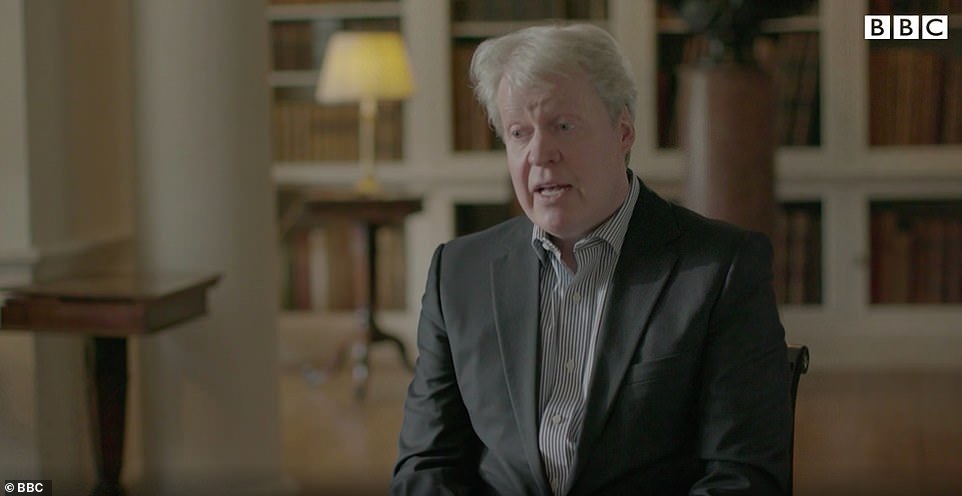
Princess Diana’s brother linked her death to the BBC after saying she reached crisis after interview deception to do Panorama
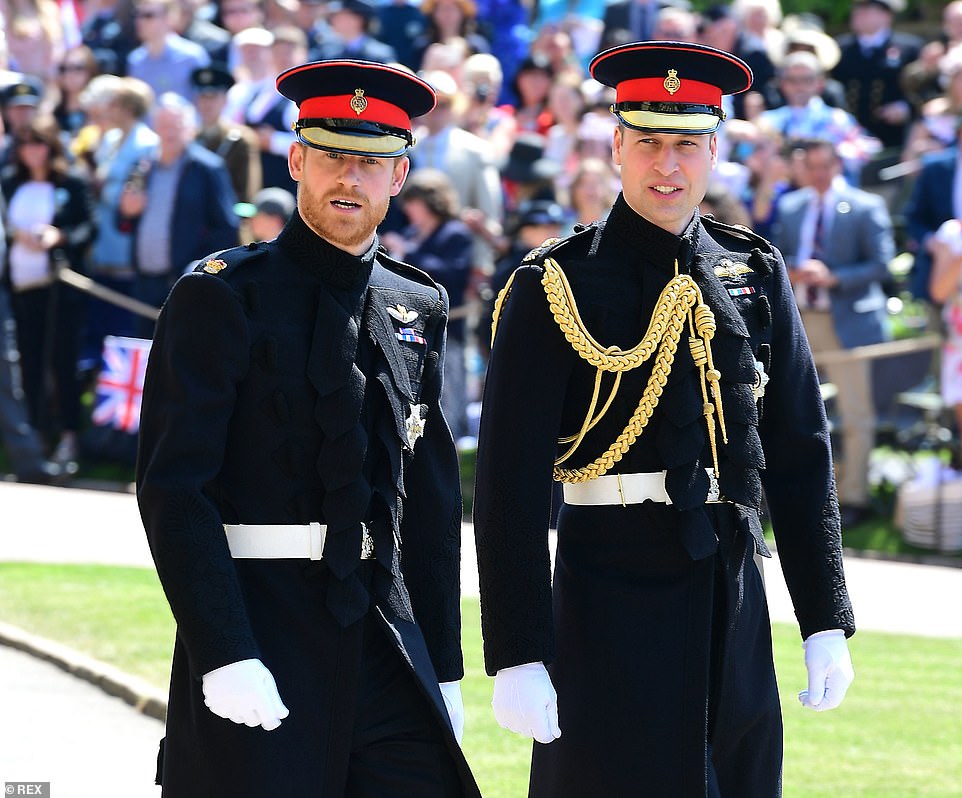
The BBC has sent personal letters of apology to William, Harry (pictured together) and other royals over Martin Bashir’s lies to persuade Diana to agree to his 1995 Panorama interview
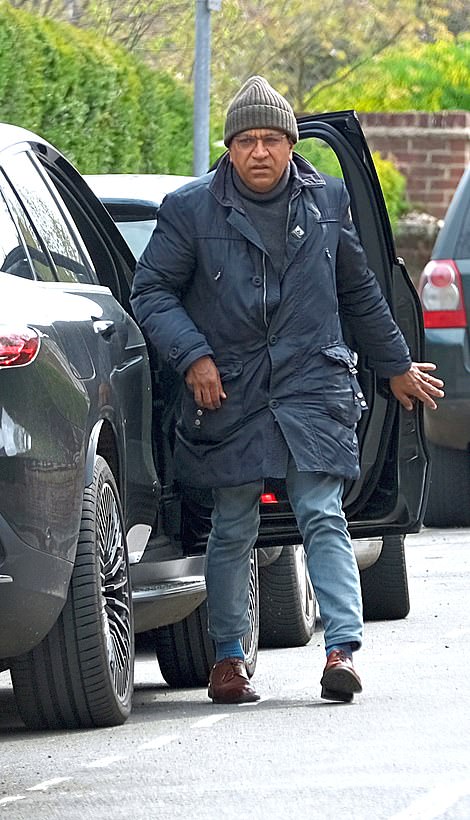
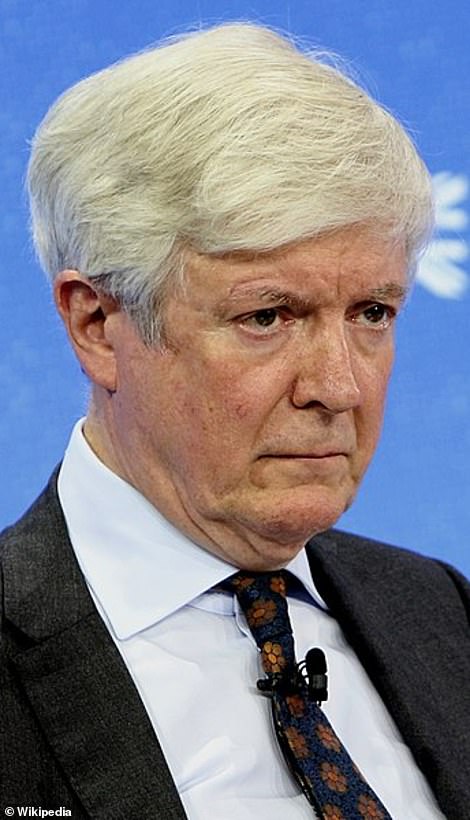
Martin Bashir (pictured on the 3rd of May) faked bank statements to get to Diana while the BBC’s former director-general, Lord Hall of Birkenhead (right), has been accused of protecting Martin Bashir (right) following his famous 1995 interview
‘It’s quite clear from the introduction that I sat in on the 19th of September 1995 everyone was going to be made untrustworthy, and I think that Diana did lose trust in really key people.
‘This is a young girl in her mid-30s who has lived this extraordinarily turbulent and difficult time in the public eye.
‘She didn’t know who to trust and in the end, when she died two years later, she was without any form of real protection.’
Earl Spencer said ‘rogue reporter’ Bashir’s strategy to get close his sister was to make ‘everyone untrustworthy’.
He said the journalist was ‘very good at amplifying people’s anxieties’ and making one think he would ‘save you in a difficult and dangerous world’.
The BBC is also returning all awards the explosive interview accrued, including a Bafta TV gong won in 1996.
Bashir announced he was stepping down from his role as the BBC News religion editor last week on health grounds.
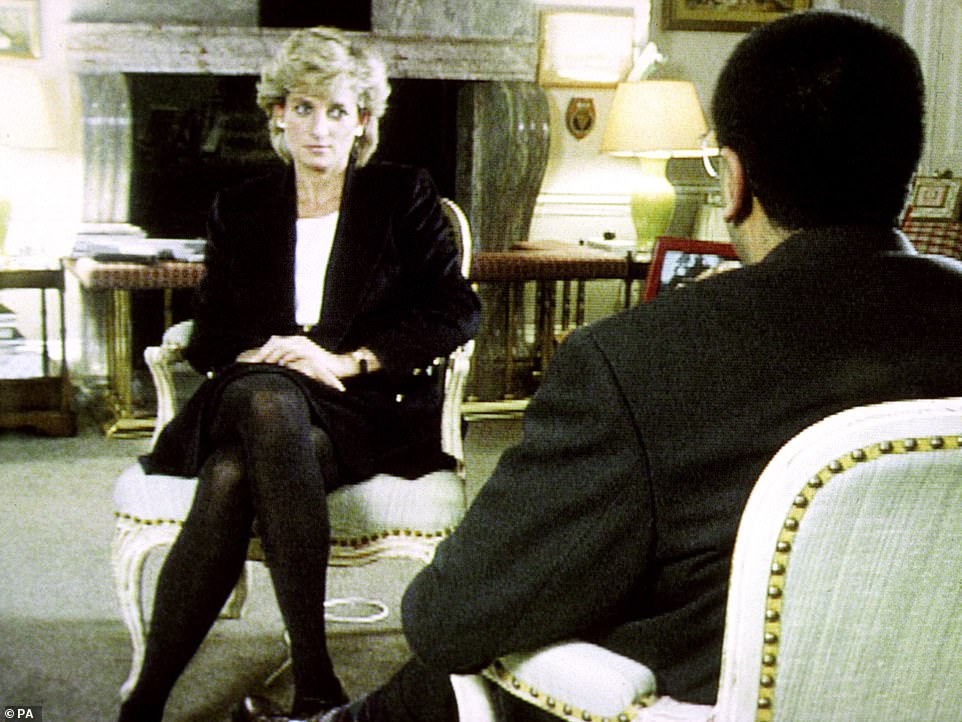
Lord Dyson was commissioned six months ago to examine whether Princess Diana would have given the historic 1995 interview had it not been for Mr Bashir’s underhand tactics
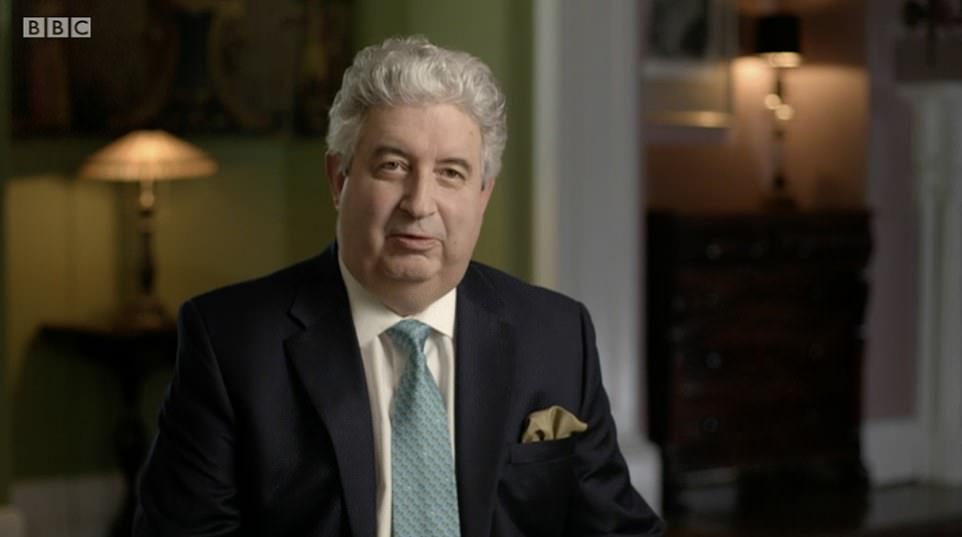
Patrick Jephson, the Princess of Wales’ private secretary at the time, also appeared in last night’s documentary
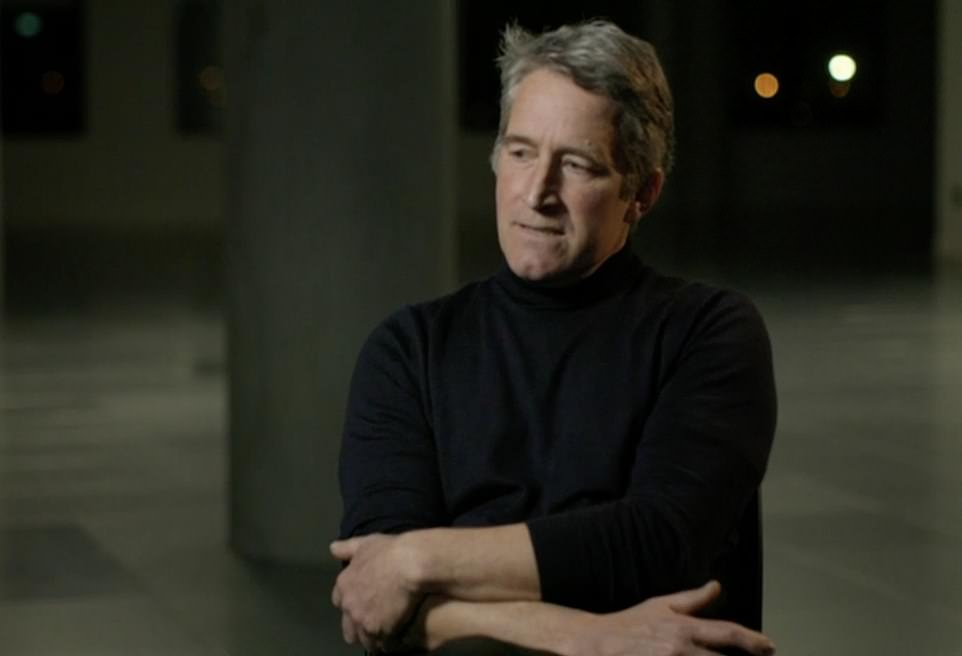
BBC graphic designer Matthew Weissler (pictured), who helped Bashir create the mocked-up bank statements, said the reporter reluctantly told him the documents were ‘about surveillance’
Patrick Jephson, the Princess of Wales’ private secretary at the time, also appeared in last night’s documentary.
He told Panorama that Diana was ‘cast adrift’ from her ‘royal support structure that had guided and safeguarded her for so many years’ because of Bashir’s claims and the fallout from the interview.
Mr Jephson added: ‘Inevitably it made her vulnerable to people who were unable properly to look after her.’
The documentary also shows a note written from Diana to her brother Earl Spencer after he informed her of Bashir’s elaborate allegations that she was being spied on.
The note – addressed to the earl with Diana’s pet name for her brother ‘Carlos’ – reads: ‘Darling Carlos, I so appreciated the contents of our telephone call this morning, it all makes complete sense to what is going on around me at this present time.
‘”They” underestimate the Spencer strength! Lots of love from Duch x’.
The programme also revealed a confidential internal BBC management document written by the outgoing head of TV Current Affairs, Tim Gardam.
It states that Bashir had misled his bosses by denying he had shown the fake bank statements to anyone.
The journalist later admitted that he had, in fact, shown them to Earl Spencer in order to ‘foster’ their relationship.
A statement drawn up by former BBC director-general Tony Hall for the corporation’s governors in April 1996 described the fakes as just ‘graphics’ and said Martin Bashir had no explanation for why he’d created them.
He went on: ‘I believe he is, even with his lapse, honest and an honourable man’.
In the same statement to the BBC’s governors, Mr Hall also acknowledged that Bashir regarded Spencer as ‘the best route’ to ‘get to the Princess of Wales.’
Film and theatre director and former BBC governor Sir Richard Eyre – who attended the April 1996 meeting – told Panorama that had Tony Hall disclosed to the governors that Bashir had lied, they would have insisted on a full inquiry.
He said: ‘The fact that Bashir lied should have been made clear to us, but in my memory, it never was.
‘Constitutionally we, the governors, deserved at the very least to be given an honest report of what was going on.
‘We can see now that the false bank statements were the lever that opened the doors to the access to Diana.
‘If we had known at the time, there’s no question that this would have been ruthlessly investigated, because [the governors] were very, very, very hot on a sense of propriety of the organisation.’
Earl Spencer told Panorama that Bashir’s strategy was to make ‘everyone untrustworthy’ as a way of getting close to him and his sister.
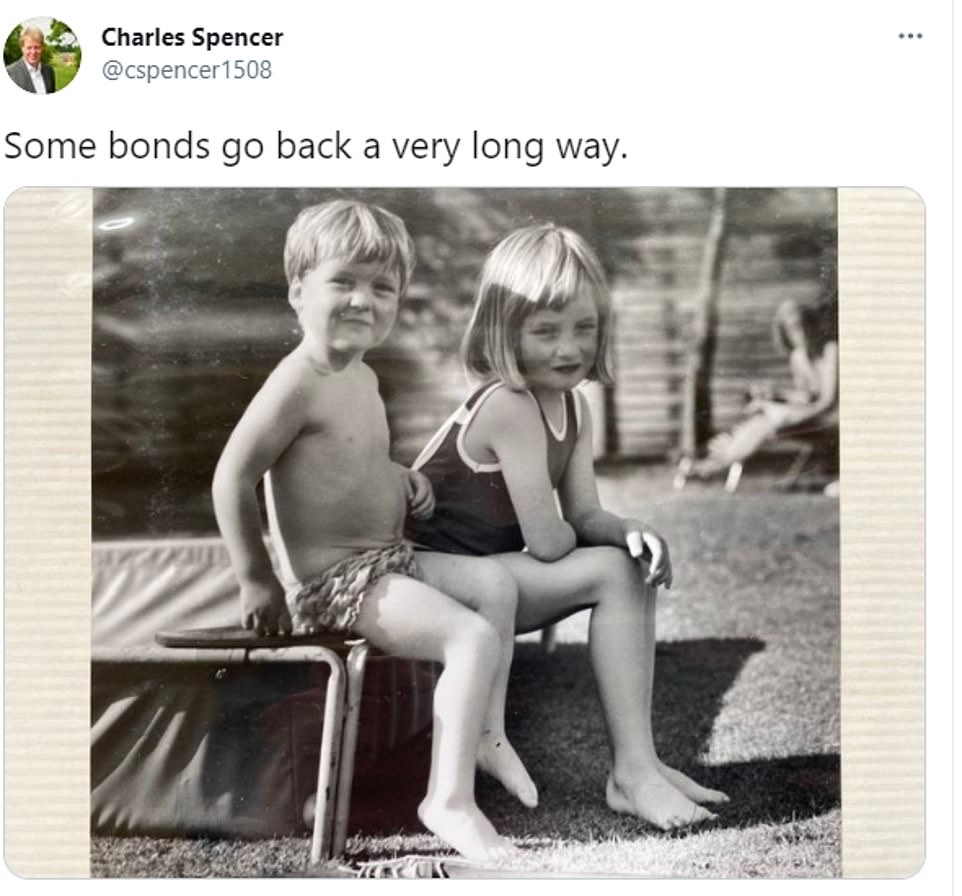
Earl Spencer, whose notes helped sink Martin Bashir, yesterday tweeted a photo of him with his older sister Diana in a poignant tribute ahead of a damning report into the BBC Panorama scandal
He said: ‘Bashir was very good at amplifying people’s anxieties.
‘He was very good at making you feel as though he was your friend who was going to save you in a difficult and dangerous world.’
After the original broadcast in 1995, BBC management relied on a note from Princess Diana which appeared to exonerate Martin Bashir.
That note was never publicised and had gone missing until recently. It reads: ‘Martin Bashir did not show me any documents nor give me any information that I was not previously aware of.
‘I consented to the interview on Panorama without any undue pressure and have no regrets.’
Earl Spencer told BBC Panorama: ‘I’ve seen the content of the letter… It doesn’t exonerate the BBC as far as I’m concerned, because Diana is dealing from a position of having been lied to…
‘She didn’t know that the whole obtaining of the interview was based on a series of falsehoods that led to her being vulnerable to this.’
Viewers took to Twitter to share their thoughts on last night’s show.
Those watching along questioned why Panorama made the documentary – when it was a 1995 Panorama episode being scrutinised.
Others said Bashir leaving the BBC on ‘health grounds’ a week before the special was ‘a massive coincidence’.
Friends of Diana’s have claimed that she might still be alive today ‘if she hadn’t spoken to Bashir’, who they nicknamed ‘The Poison Dwarf’ after his betrayal emerged.
Patrick Jephson, the Princess of Wales’ then-private secretary, said claims Bashir made about him in a bid to get closer to Diana were ‘entirely made up’.
In the documentary, Mr Jephson was shown a note taken at the meeting between Diana and Bashir branding him ‘dangerous’.
He said: ‘Well I suppose from Martin Bashir’s perspective I was the obstacle that had to be removed. So by removing me from a position of trust, it left the way open for him to give her any yarn he wanted to try and ingratiate himself with her.’
Addressing the initial meeting between Diana and Bashir which he arranged, Earl Spencer said some of the claims were so fantastical that both he and Diana brushed them off as untrue.
Earl Spencer warned Diana that the claims weren’t adding up, and ‘apologised’ to his sister for making the introduction.
The earl thought ‘that was it’ and said: ‘I still take full responsibility for introducing this man to Diana. But at the end of the day I had done my due diligence.’
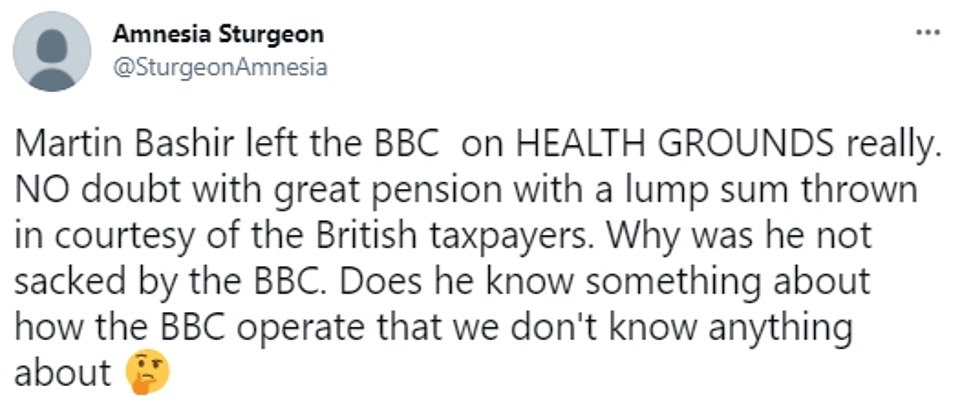
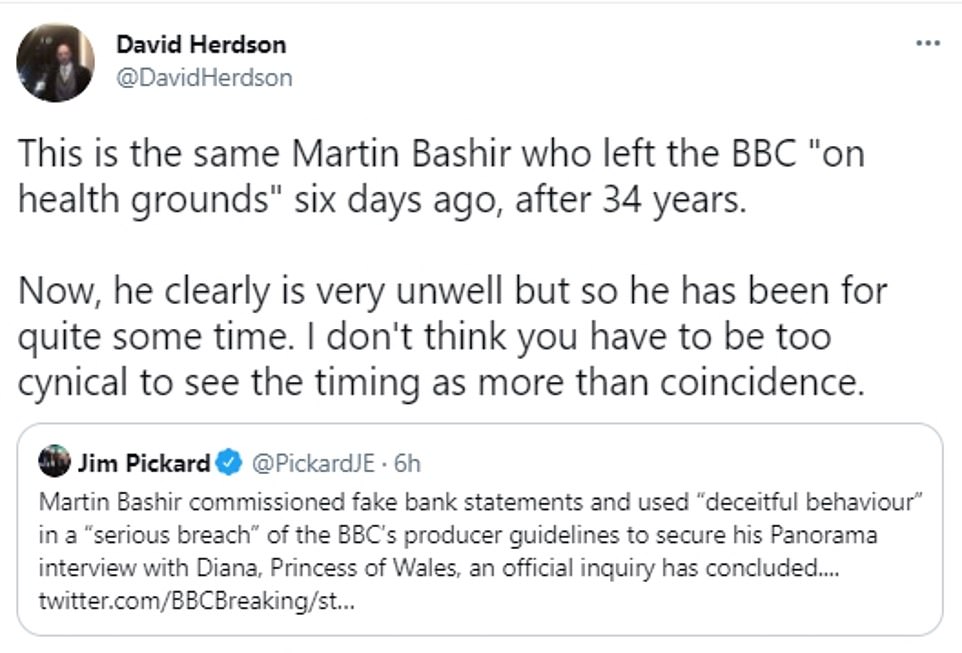
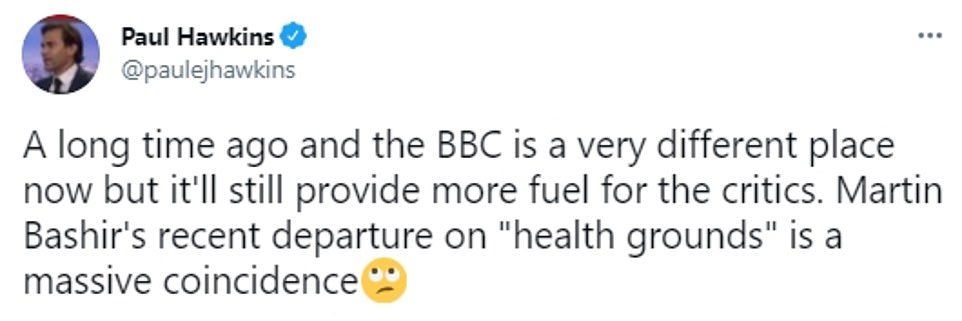
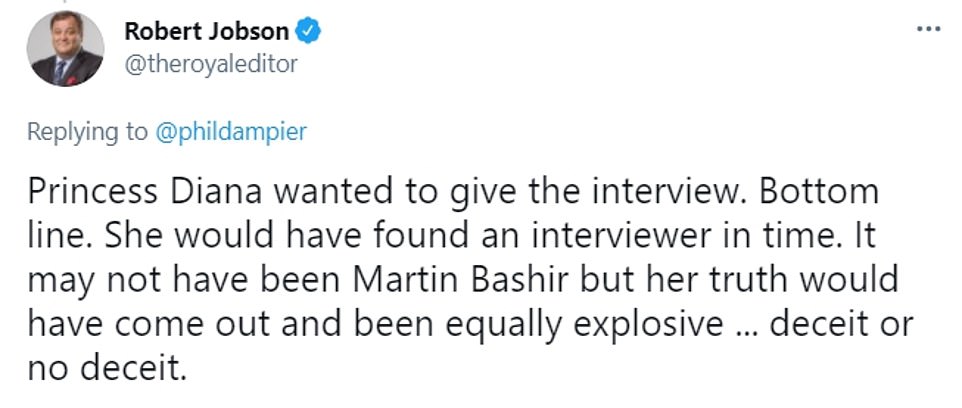



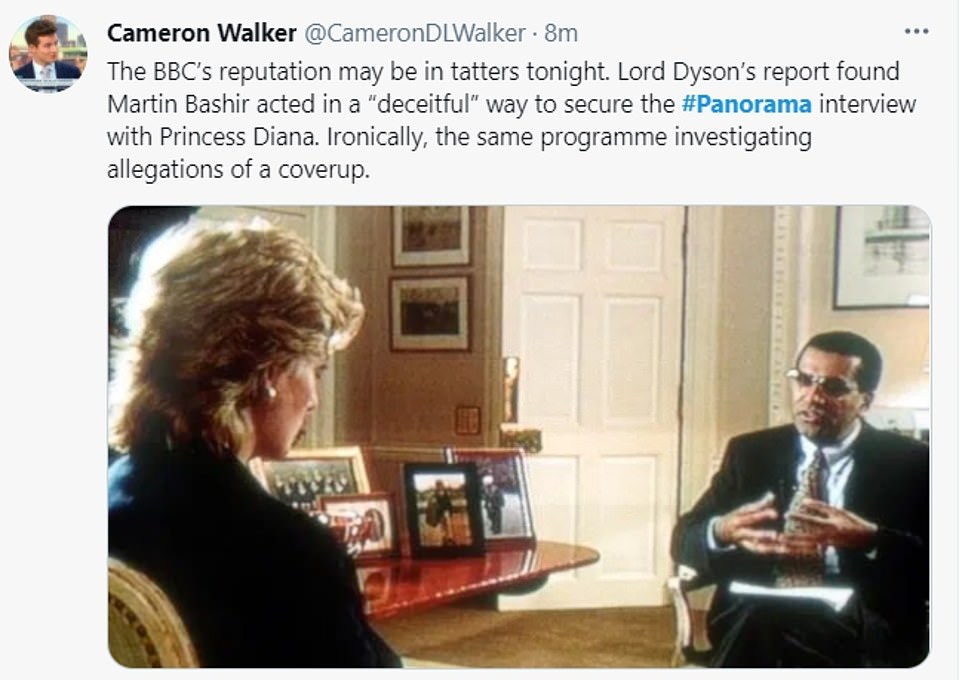


BBC graphic designer Matthew Weissler, who helped Bashir create the mocked-up bank statements, said the reporter reluctantly told him the documents were ‘about surveillance’.
Harry Dean – then-deputy editor of Panorama – found out about the forged documents. He phoned the series’ editor Steve Hewlett – who had vouched for Bashir’s integrity to Earl Spencer.
Mr Hewlett told Mr Dean ‘I don’t see why this is any of your f***ing business’ in an in-person meeting, the deputy editor claimed, before assuring him that nothing was amiss.
Mr Weissler said Mr Hewlett ‘didn’t seem to understand that I had a real concern’. He just ‘thanked’ the graphic designer and said things were being handled.
Bashir told bosses the documents couldn’t have been used to persuade Diana to take part in the interview because she was the source of the information.
But Bashir had met Diana three weeks after the documents were forged – dates which the BBC were aware of.
Mr Jephson told of a change in the princess after the initial meeting with Bashir.
‘There was a heightened state of anxiety. I was aware there was something the matter and it involved me and I didn’t know what it was but I hoped it would make itself known sooner or later.’
‘After the interview relationships with Buckingham Palace became very strained. So professionally, just speaking as a private secretary, my job, which is already not easy, became I felt impossibly difficult.’
He quit his post in the fallout of the bombshell interview, saying the move was ‘devastating’ and a ‘life changing event’.
In his damning report, Judge Lord Dyson, who carried out a six-month investigation, said: ‘Mr Bashir deceived and induced him [Earl Spencer] to arrange a meeting with Princess Diana. By gaining access to Princess Diana in this way, Mr Bashir was able to persuade her to agree to give the interview. This behaviour was in serious breach of the 1993 edition of the BBC’s Producer Guidelines on straight dealing.’
Lord Hall’s subsequent 1996 investigation into claims Diana was hoodwinked by Bashir was ‘woefully ineffective’, the judge said yesterday, especially because their inquiry ‘did not scrutinise’ Bashir despite knowing he had lied three times about showing the fake bank statements to Earl Spencer.
‘Lord Hall could not reasonably have concluded, as he did, that Mr Bashir was an honest and honourable man’, the report said. The BBC had ‘without justification’ ‘covered up’ Mr Bashir’s tricks and ‘thereby fell short of the high standards of integrity and transparency which are its hallmark’, said Lord Dyson.
Lord Birt, director-general of the BBC at the time of the interview, said yesterday: ‘We now know that the BBC harboured a rogue reporter on Panorama who fabricated an elaborate, detailed but wholly false account of his dealings with Earl Spencer and Princess Diana.
‘This is a shocking blot on the BBC’s enduring commitment to honest journalism, and it is a matter of the greatest regret that it has taken 25 years for the full truth to emerge.
‘As the director-general at the time, I offer my deep apologies to Earl Spencer and to all others affected.’
Lord Hall yesterday insisted his ‘integrity’ remained intact despite the criticism and pointed the finger at the shamed journalist, saying he was ‘wrong to give Martin Bashir the benefit of the doubt’.
And a defiant Mr Bashir said in a statement this afternoon: ‘This is the second time that I have willingly fully co-operated with an investigation into events more than 25 years ago.
‘I apologised then, and I do so again now, over the fact that I asked for bank statements to be mocked up. It was a stupid thing to do and was an action I deeply regret. But I absolutely stand by the evidence I gave a quarter of a century ago, and again more recently.
‘I also reiterate that the bank statements had no bearing whatsoever on the personal choice by Princess Diana to take part in the interview.
‘It is saddening that this single issue has been allowed to overshadow the princess’ brave decision to tell her story, to courageously talk through the difficulties she faced, and, to help address the silence and stigma that surrounded mental health issues all those years ago.
‘She led the way in addressing so many of these issues and that’s why I will always remain immensely proud of that interview.’
He later added: At the time I was approached for comment, Lord Dyson’s report had not yet been published and I was restricted from responding due to confidentiality obligations that I owe to the BBC and to Lord Dyson, which I take seriously. As a result I have been unable to provide a detailed response to the allegations except to say that I consider there to be cogent evidence that casts doubt on or even disproves many of the allegations, and I will provide further information when I am able to do so.’
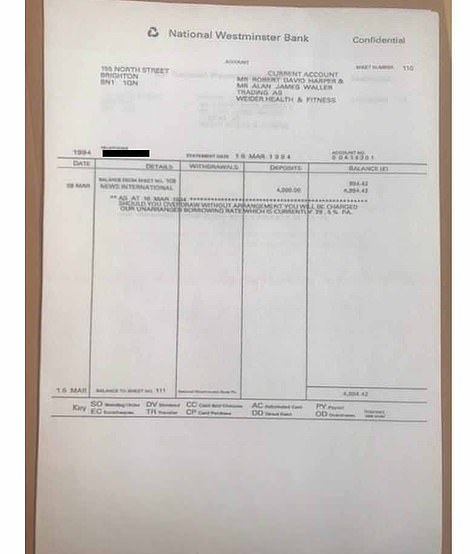
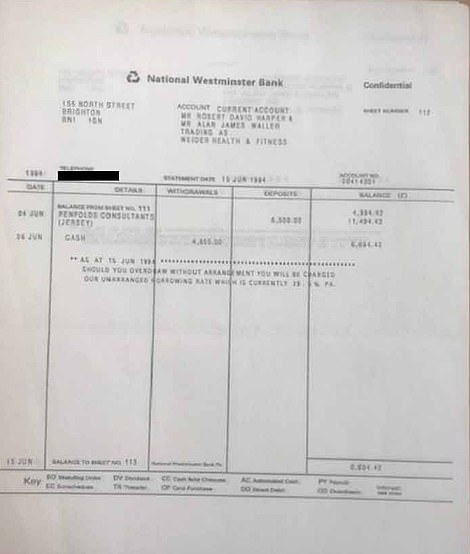
Bashir mocked up these bank statements to convince Earl Spencer to help broker an interview with Diana in an extraordinary breach of BBC editorial guidelines
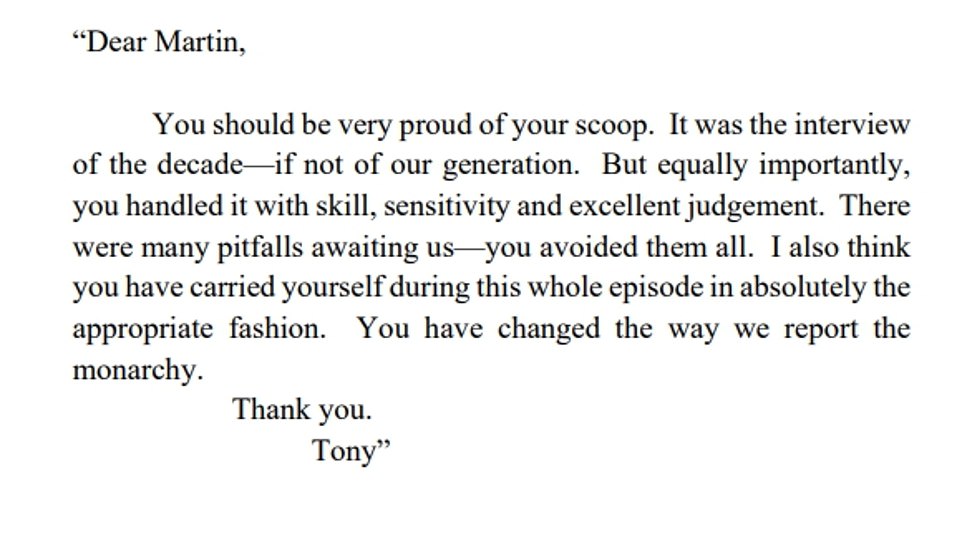
Tony Hall sent this gushing note to Mr Bashir after the 1995 show saying he had ‘changed the way we report the monarchy’ – but yesterday said he was wrong to trust him and insisted his own integrity is intact
Senior BBC executives were criticised over a 1996 internal investigation which examined the mocked-up documents relating to the earl’s former employee, as it tried to determine whether or not the princess had been misled, with a key piece of evidence, a note from Diana, suggesting she had not.

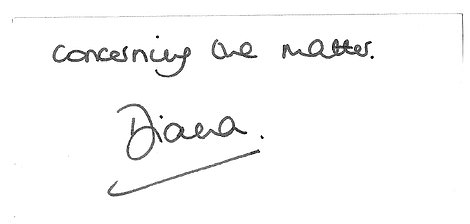
A letter, which was included as evidence in the Lord Dyson report, written on official Kensington Palace stationery and signed by Diana said: ‘Martin Bashir did not show me any documents, nor give me any information that I was not previously aware of. I consented to the interview on Panorama without any undue pressure and have no regrets concerning the matter.’
Yesterday’s report said Bashir had lied when he said that he had not shown the documents to anyone, when he had in fact shown them to Earl Spencer, and he repeated this lie two more times.
It also said Bashir was ‘unable or unwilling’ to offer a credible explanation of why he had commissioned the faking of statements and why he had shown them to Earl Spencer, and Earl Spencer was not approached to give his version of what had happened.
The report said: ‘They accepted the account that Mr Bashir gave them as truthful.’
Lord Dyson added: ‘I have concluded that, without justification, the BBC covered up in its press logs such facts as it had been able to establish about how Mr Bashir secured the interview; and failed to mention the issue at all on any news programme and thereby fell short of the high standards of integrity and transparency which are its hallmark.’
Mr Jephson, who was the Princess of Wales’ equerry and private secretary for eight years until 1996, issued a statement suggesting the Panorama interview had ‘tragic consequences’ for Diana.
Lord Dyson’s report stated Mr Jephson was the subject of fake documents likely to have been produced by broadcaster Martin Bashir and shown to Diana’s brother Earl Spencer as the journalist tried to gain access to the princess.
Mr Jephson has previously said a ‘line’ leads from her interview with Bashir to the night she died in 1997 in a Paris car crash.
He said in his statement: ‘After so many years it is a relief to know more of the truth behind events which had so many unhappy and even tragic consequences.
‘I am grateful to Lord Spencer, Lord Dyson and the tenacious journalists who brought the story to light. I also acknowledge the BBC’s full apology which I received from the Director General this afternoon.’
Mark Killick, a senior producer on Panorama at the time, said Martin Bashir’s behaviour was ‘disgraceful’ and the BBC ‘little better’.
He said in a statement: ‘Lord Dyson’s report shows that what Martin Bashir did was disgraceful and what the BBC management did was little better. When I first found out what had happened, I consulted a BBC lawyer, then talked to Bashir and senior colleagues before using the editorial referral route.
‘I knew when I did it that the BBC might react badly, but I had no idea just how far they would go to try and discredit me.
‘Whilst this happened some time ago, the BBC should give a commitment to its staff that they can safely raise the sort of matter that I was faced with without losing their job or having the BBC’s vast publicity machine unleashed against them.’
DCMS Committee chairman Julian Knight said the group would be reviewing Lord Dyson’s findings and the BBC’s response to the report.
He said: ‘This forensic report by Lord Dyson finally gets to the truth of the events behind the BBC Panorama interview with Diana, Princess of Wales.
‘It raises a number of unacceptable failings by the BBC in its internal investigation of the events behind the interview and I welcome the full acceptance of the findings by the BBC.
‘The DCMS Committee will be reviewing the report’s findings and will scrutinise the BBC’s response to the report as part of its ongoing scrutiny of the work of the BBC.’
Former director-general Lord Tony Hall has said he accepts the 1996 BBC inquiry into how Panorama secured its interview with Diana, Princess of Wales, ‘fell well short of what was required’ and he was ‘wrong to give Martin Bashir the benefit of the doubt’.
The report said: ‘Without justification, the BBC fell short of the high standards of integrity and transparency which are its hallmark by covering up in its press logs such facts as it had been able to establish about how Mr Bashir secured the interview and failing to mention Mr Bashir’s activities or the BBC investigations of them on any news programme.’
Lord Hall said: ‘I have read Lord Dyson’s report, and I accept that our investigation 25 years ago into how Panorama secured the interview with Princess Diana fell well short of what was required.
‘In hindsight, there were further steps we could and should have taken following complaints about Martin Bashir’s conduct.
‘I was wrong to give Martin Bashir the benefit of the doubt, basing that judgment as I did on what appeared to be deep remorse on his part.

In a written statement Bashir insisted he did not ‘manipulate’ Diana, which he says was confirmed by her
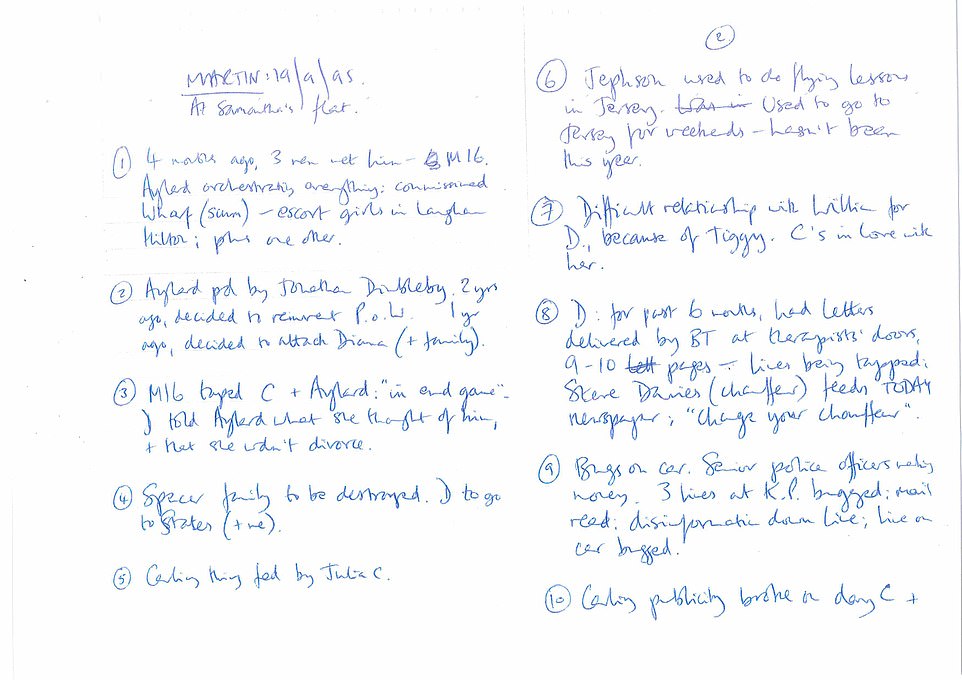
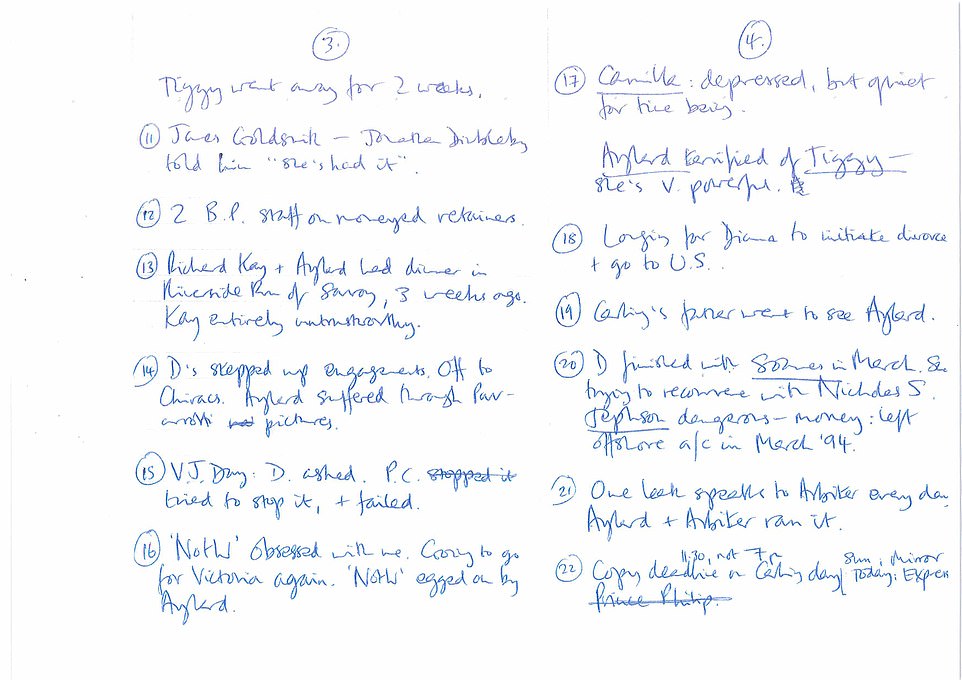
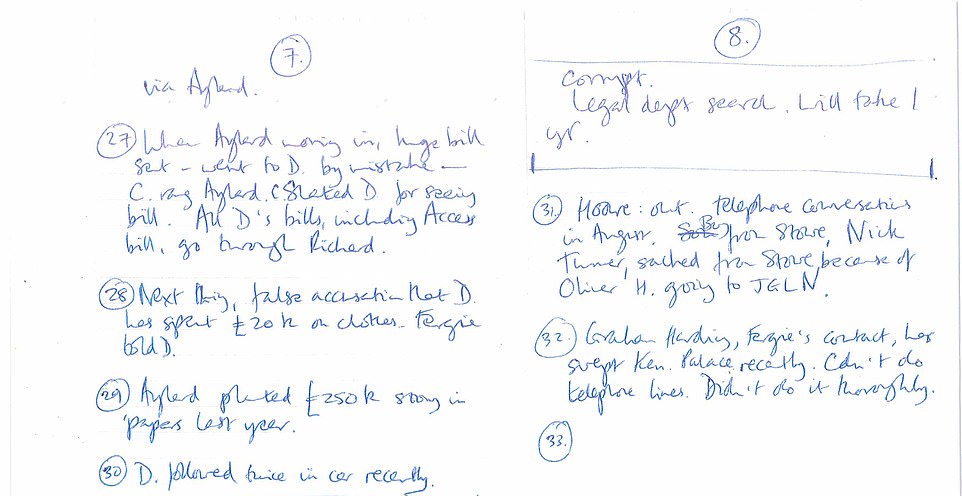
These bombshell handwritten notes by Earl Spencer were published yesterday, which led to Bashir’s lies being exposed
‘Throughout my 35-year career at the BBC, I have always acted in ways I believe were fair, impartial and with the public interest front and centre.
‘While Lord Dyson does not criticise my integrity, I am sorry that our investigation failed to meet the standards that were required.’
He added in a statement to the BBC: ‘I have participated in Lord Dyson’s inquiry, have answered all his questions as fully as I can, and in the light of that, and without sight of his report, don’t feel it’s appropriate to comment further, beyond making the following points.
‘When we undertook the investigation a quarter of a century ago, our overriding concern was to ascertain whether Princess Diana had been misled by Martin Bashir into giving the interview.
‘It was clear from the correspondence from her that she had not been misled – that she had no concerns, that she had been shown no documents and was glad she had given the interview. Given this background, I decided to allow Mr Bashir to continue with a severe reprimand and under close supervision.
‘I was open and transparent with the Director-General and with colleagues on the Board of Management and I believe I gave them all the key facts.
‘The minutes of meetings with them will not have fully reflected everything that was said – they never do.
‘As a point of fact I was never asked to appear before the Board of Governors on this issue.
‘Throughout I discharged my responsibilities in good faith.’
Lord Dyson, the former master of the rolls and head of civil justice, was appointed to look into the circumstances surrounding the explosive 1995 sit-down, which famously featured Diana saying: ‘Well, there were three of us in this marriage, so it was a bit crowded.’
Bashir, who was the BBC News religion editor and announced last week he was leaving on health grounds, is accused of mocking up bank statements allegedly used to gain access to her brother and Diana, and then spinning a slew of lies to hoodwink her into the interview that would hasten the end of her marriage and the removal of her HRH status. One of Diana’s friends claimed yesterday she believes she would still be alive if she hadn’t spoken to Bashir.
BBC Director-General, Tim Davie said yesterday: ‘The BBC accepts Lord Dyson’s findings in full. Although the report states that Diana, Princess of Wales, was keen on the idea of an interview with the BBC, it is clear that the process for securing the interview fell far short of what audiences have a right to expect. We are very sorry for this. Lord Dyson has identified clear failings.
‘While today’s BBC has significantly better processes and procedures, those that existed at the time should have prevented the interview being secured in this way. The BBC should have made greater effort to get to the bottom of what happened at the time and been more transparent about what it knew.
‘While the BBC cannot turn back the clock after a quarter of a century, we can make a full and unconditional apology. The BBC offers that today.’
The inquiry found Martin Bashir commissioned fake bank statements and used ‘deceitful behaviour’ in a ‘serious breach’ of the BBC’s producer guidelines to secure the interview.
Earl Spencer, who has long campaigned for justice for his older sibling, shared an image of himself and his sister Diana, Princess of Wales as children ahead of the publication of Lord Dyson’s report.
He posted the black and white archive image on Twitter, alongside the poignant words: ‘Some bonds go back a very long way.’ The photograph shows the siblings sat side by side in the summer sun, with a young Charles Spencer wearing trunks and Diana appearing to be in a swimsuit.
The findings could now pave the way for huge damages claims from BBC and royal staff who lost their positions as a result of the explosive interview, it is claimed, with one source calling the case the corporation’s ‘phone hacking moment’. Lord Hall is said to have been given advanced warning he will be criticised, and is said to be worried he could lose his current job as chairman of the National Gallery in London.
Handwritten notes taken by the Princess of Wales’ brother Earl Spencer during a 90-minute secret meeting with him, Bashir and his sister at a flat in Knightsbridge in 1995 blew open the case. The eight pages from a lined notepad revealed that the BBC reporter made a series of false claims that helped him land the interview of the century where the Princess of Wales opened up on her broken marriage with Charles.
Earl Spencer’s records show that Bashir allegedly claimed that Diana’s private letters were being opened, her car tracked and phoned tapped with her bodyguard plotting against her, and close friends were betraying her.
The notes, handed to Lord Dyson, also contained allegations MI6 had recorded Prince Charles and his private secretary planning the ‘end game’ – an extraordinary and false hint the heir to the throne was plotting to ‘destroy’ the Spencers and force them to flee to the US.
Earl Spencer says that there were 32 jaw-dropping smears peddled by Martin Bashir , but the journalist, who quit the BBC last week, is understood to have denied this to inquiry chief Lord Dyson, and may have argued that some of these claims came from Diana’s mouth.
Lord Hall of Birkenhead, 70, was identified in 60 pages of previously secret documents as being a ‘key figure’ who helped protect the BBC journalist following his explosive 1995 interview with the royal.
It came after concerns were raised by three Panorama journalists about Mr Bashir at the time, with friends claiming that the rogue reporter ‘destroyed her psychologically and made her paranoid’.
Simone Simmons , 61, who also gave evidence during the inquiry and was at one meeting, said yesterday: ‘The interview led to her divorce and losing her HRH titles. He destroyed her psychologically and made her paranoid — saying the royals wanted to bump her off and distrust her loyal staff and friends’.
A year after the interview, an internal inquiry led by Lord Hall found that Mr Bashir was an ‘honest man’ and there was ‘no question of Mr Bashir trying to mislead or do anything improper’.
Documents seen by Lord Dyson of minutes taken from meetings of the BBC news and current affairs board after the controversial interview showed three Panorama journalists, who later left the show, raised concerns about Mr Bashir’s conduct.
Lord Hall is also accused of telling graphic designer Matthew Weissler that he ‘will not work for the BBC again’.
A BBC source told The Times: ‘What happened at Panorama with Bashir set the culture of the BBC where staff were afraid to raise concerns about wrongdoing.
‘It also set the format for how far you can push it and then cover up to get a scoop.
‘It is not acceptable for a licence fee- funded organisation. The whistleblowers were axed and those who covered up were promoted.’
The six-month inquiry, which was conducted by former judge Lord Dyson, confirms that Mr Bashir mocked up bank statements that were shown to Princess Diana’s brother, Earl Spencer, in order to win the trust of the royal.
Lord Dyson was commissioned last year to examine whether Princess Diana would have given the historic 1995 interview, in which she famously declared ‘there were three of us in this marriage’, had it not been for Mr Bashir’s underhand tactics.
During the inquiry, notes given to the judge by Princess Diana’s brother, Earl Spencer, which were seen by The Telegraph, detailed a conversation between Mr Bashir and Princess Diana prior to the famous interview.
It included a list of allegations made by Mr Bashir that Princess Diana’s phones had been bugged and that she was being followed.
The BBC’s controller of editorial policy in 1995, Richard Ayre, told The Telegraph: ‘The use of deceit in making factual programmes would have been permissible only in the case of investigating serious crime… and where prima facie evidence of the guilt of that person being investigated had already been obtained.
‘Those circumstances clearly don’t apply to an interview with the Princess of Wales.’
Lord Dyson warned he would follow the evidence – even if that meant straying from his brief, it can be revealed. A document seen by the Daily Mail shows he refused to be restricted to a ‘narrow’ investigation.
A second source suggested the eminent former Master of the Rolls had taken an interest in Mr Bashir’s wider career.
After allegedly using dirty tricks to convince Diana to be interviewed for Panorama, the reporter went on to other high-profile scoops including a controversial documentary on Michael Jackson.
The disgraced pop singer later complained he felt tricked by Mr Bashir.
The reporter was accused of telling shocking lies to relatives of those murdered by GP Harold Shipman and peddling damaging ‘untruths’ to Scotland Yard about the Soho bombings case, it was claimed.
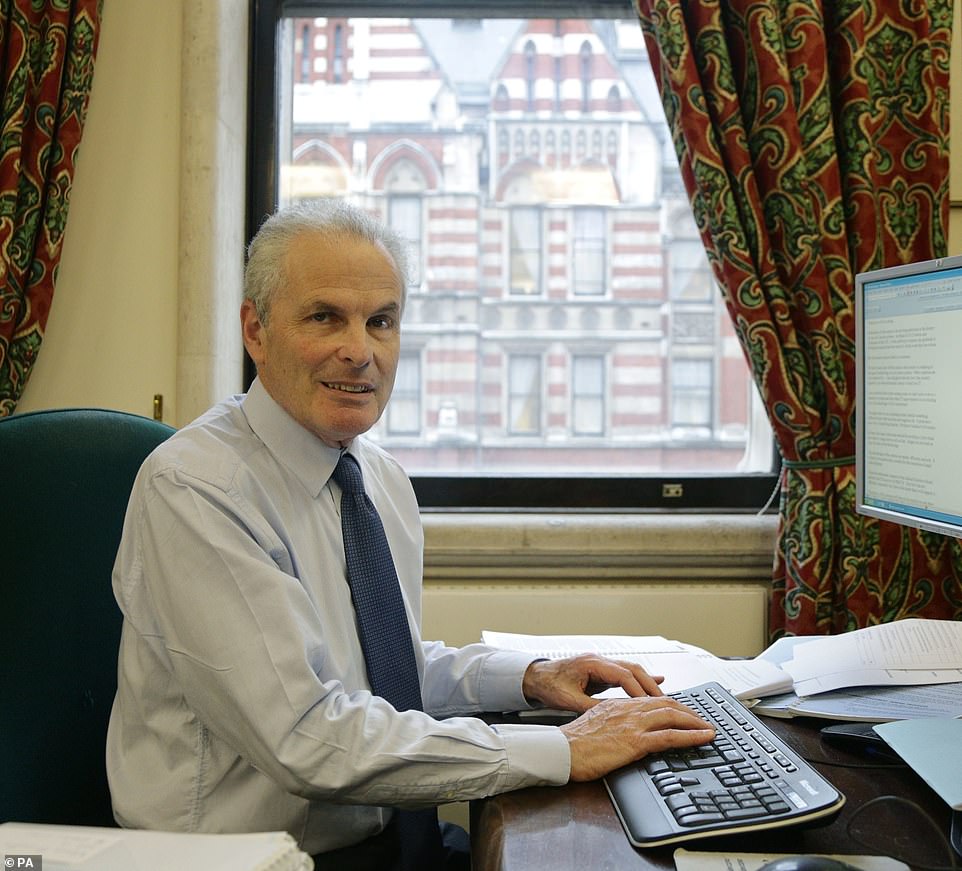
Last November the BBC commissioned former Supreme Court judge Lord Dyson (pictured) to probe allegations that the corporation covered up the trail of deceit by its reporter
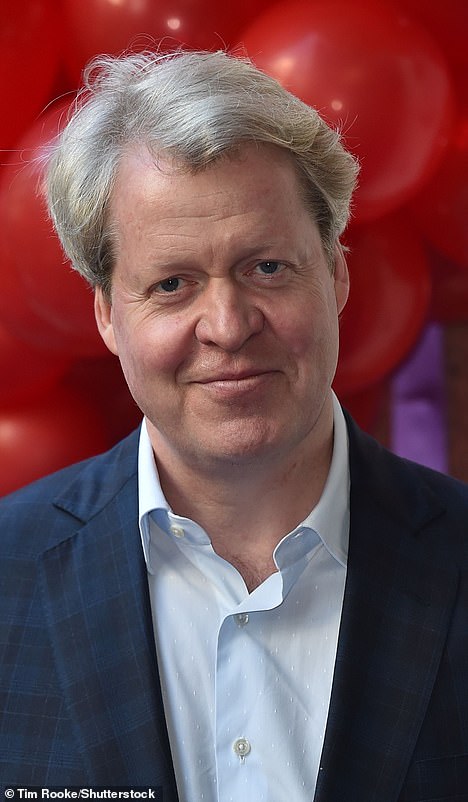
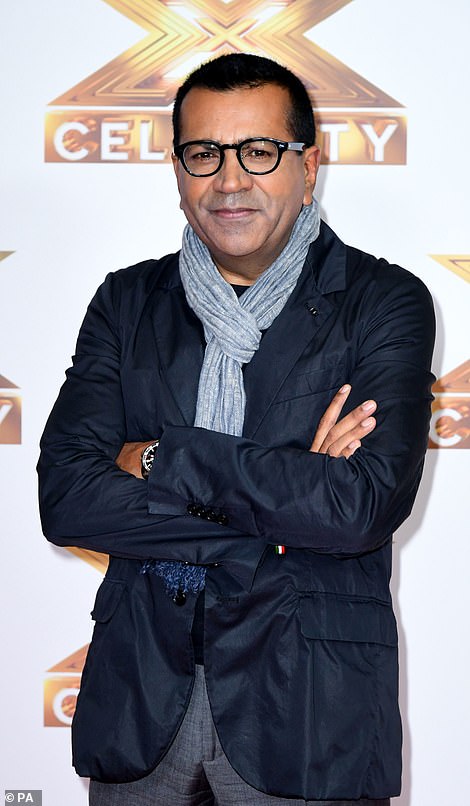
Mr Bashir is accused of using the fake bank statements to gain Earl Spencer’s trust
It is not known whether Lord Dyson has addressed these claims in the report, or drawn any broader conclusions about Mr Bashir’s modus operandi.
But after the BBC commissioned him to probe the circumstances of the Diana interview, the judge vowed not to be constrained by that one episode.
A source close to the inquiry said Lord Dyson had pledged to ‘conduct a fearless investigation’ and was ‘determined to get to the truth’.
They added that he would not adopt a ‘narrow interpretation’ of his terms of reference, which he regarded as just a ‘framework’. Lord Dyson would also pursue evidence ‘covering a wider timeframe’ if he wanted to.
Lord Dyson was commissioned six months ago to examine whether Diana would have given the historic 1995 interview – in which she declared ‘there were three of us in this marriage’, hastening the royal divorce – had it not been for Mr Bashir’s underhand tactics.
Mr Bashir is still the BBC’s religion editor, although he handed in his notice last month after a series of health scares.
The Mail revealed last November how he spun an extraordinary web of deceit to clinch his interview.
He allegedly told a string of lies to gain Diana’s trust, including cruelly playing to her paranoia by pretending he had evidence that her staff were spying on her for newspapers and MI5.
It is claimed the lurid smears included an allegation that Prince Edward was being treated for Aids at a London hospital, that the Queen was a ‘comfort eater’ with ‘heart problems’, and that Prince Charles was ‘in love’ with his children’s nanny Tiggy Legge-Bourke and went on a secret holiday with her.
It comes as Princess Diana’s friend Simone Simmons , 61, who also gave evidence during the inquiry, claimed Mr Bashir ‘conned’ the royal into giving the interview.
Ms Simmons told The Sun: ‘Diana was conned into doing the programme, and it wasn’t just forged bank documents.’
She added: ‘He was an out and out b*****d. He destroyed her psychologically and made her paranoid — saying the royals wanted to bump her off and distrust her loyal staff and friends.
‘We nicknamed Martin Bashir the Poison Dwarf. The interview led to her divorce and losing her HRH titles.
‘There is no doubt in my mind that Diana would still be alive today if she hadn’t spoken to Bashir.
‘I hope they throw the book at him. Justice should be done.’
Revealed: Long-lost letter that Diana sent to Martin Bashir saying she had ‘no regrets’ and wasn’t ‘pressured’ into Panorama interview – as it emerges Harry and William were dragged into probe to confirm it was their mother’s writing
A long-lost letter that Princess Diana sent to BBC journalist Martin Bashir saying she had ‘no regrets’ and wasn’t ‘pressured’ into her bombshell Panorama interview was sensationally revealed yesterday for the first time.
The note, which was written on official Kensington Palace stationery and signed by Diana in December 1995, was included as evidence in the official inquiry into the conduct of the reporter in securing the interview.
Lord Dyson’s report also revealed that solicitors representing Princes William and Harry had said the ‘handwriting, notepaper and signature would appear to indicate that the author was Princess Diana’.
The letter, which was in an envelope marked ‘Martin’, said: ‘December 22, 1995. Martin Bashir did not show me any documents, nor give me any information that I was not previously aware of. I consented to the interview on Panorama without any undue pressure and have no regrets concerning the matter. Diana.’
The word ‘no’ was underlined, as was her name. The report also revealed how an anonymous man was asked in early 1996 by a member of BBC management to ‘guard it with his life’ and took the note home for safekeeping.
It was kept filed in a study, and taken to his new house when he moved. Then in November 2020, the man became aware of the news story that the note was missing – and found it along with other BBC papers he kept.
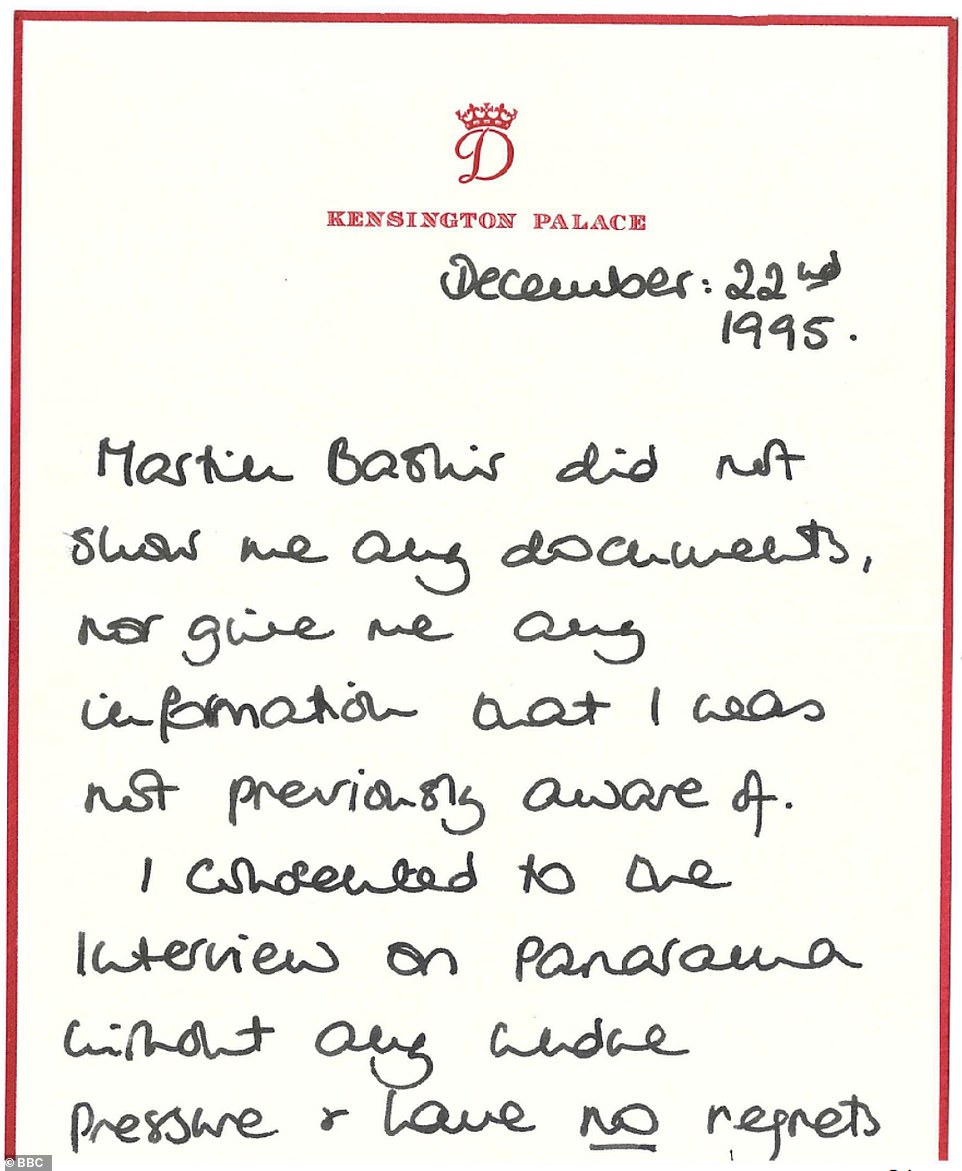
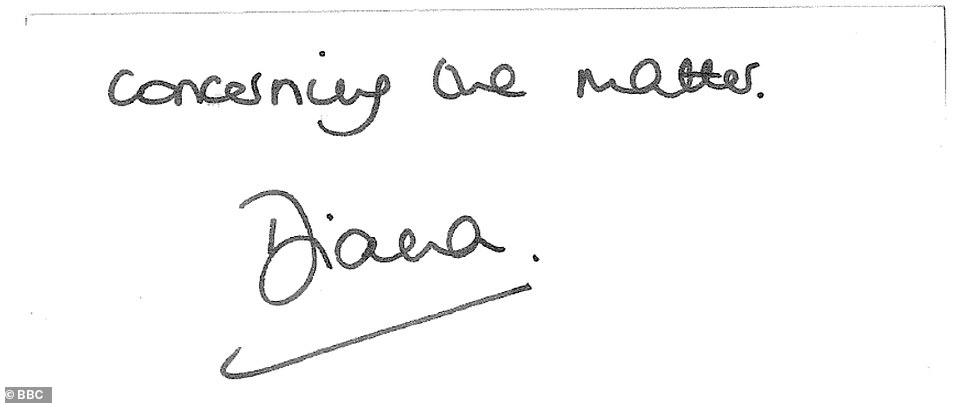
The long-lost letter that Princess Diana sent to BBC journalist Martin Bashir saying she had ‘no regrets’ and wasn’t ‘pressured’
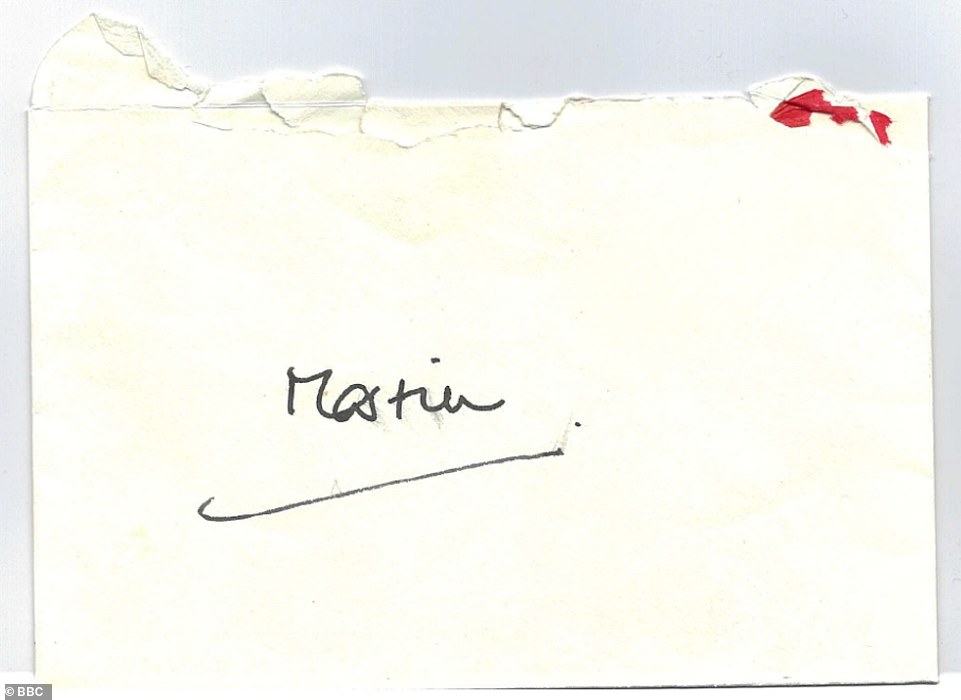
The letter on Kensington Palace paper was in an envelope marked ‘Martin’, dated December 22, 1995 and signed by Diana
The person then told the BBC’s legal department on November 10 last year. Someone from the corporation went to his house and collected the Diana note along with the other BBC documents, according to the report.
Lord Dyson said BBC management ‘believed that this note put an end to any concerns about the methods deployed, in particular by Mr Bashir, in securing the interview’.
He added that suspicions had been raised that it was a forgery, but he was ‘satisfied that it is a genuine document’.
Lord Dyson wrote in his report: ‘Harbottle & Lewis, solicitors representing the Duke of Cambridge and the Duke of Sussex, have told me that the handwriting, notepaper and signature would appear to indicate that the author was Princess Diana.
‘Moreover, an account has been provided to me on condition of confidentiality of what became of the document between, probably, early in 1996 and November 2020. The person concerned was asked early in 1996 by someone in BBC Management to ‘guard it with his life’ (or words to that effect).
‘At some point, he took it home for safekeeping and filed it in his study. When he moved house, he took it (and other documents relating to the Diana interview) to his new house. In about early November 2020, he became aware of the news story that the Diana note was missing. He searched for it and found it together with the other BBC documents that he had kept.
‘On November 10, 2020, he informed the BBC’s Legal Department. On the same day, someone from the BBC went to his house and collected the Diana note and the other BBC documents. I see no reason not to accept the truth of the whole of this account.’
Last November, the BBC announced it had ‘recovered’ the long-lost note handwritten by Diana – supposedly the corporation’s ‘get out of jail free’ card for the Bashir scandal.
Until then, the corporation had unable to locate the Princess’s crucial letter, which it had previously used to exonerate itself over claims of Bashir’s underhand tactics.
A BBC spokesman said last November: ‘The BBC has now recovered the Princess’s original handwritten note which is referred to in our records from the time. We will pass it on to the independent investigation.
‘As there has been a lot of commentary about this note and journalists have asked about it, we thought it appropriate to put on record that we’ve now recovered it.’
At the time, former head of royal protection Dai Davies said: ‘It all sounds very convenient to me, suddenly finding crucial evidence. This is no way to hold an inquiry, with key participants just coming up with useful evidence.
‘This should all be being handled by the police, not the BBC press office. If this was any other organisation, they would be getting a heavy knock on the door from police officers.’
The exact wording of the letter by Diana, who died in Paris in August 1997, had never been seen publicly until yesterday.
‘I was wrong to trust Martin Bashir’: Ex-BBC chief Lord Tony Hall issues grovelling apology after Panorama report – as his backslapping letter to the reporter emerges telling him he should be ‘proud’ of the ‘scoop of the generation’
Former BBC Director General Lord Hall sent Martin Bashir a back-slapping letter praising him for the ‘scoop of our generation’ after his bombshell Panorama interview with Diana, it emerged yesterday – as an inquiry found the shamed journalist misled the princess to obtain the interview.
In a note sent one day after the 1995 interview aired, Lord Hall of Birkenhead told Bashir he had behaved in ‘absolutely the appropriate fashion’ and ‘changed the way we report on the Monarchy’, as he said he should be ‘proud’ of the broadcast and had exercised ‘skill, sensitivity and excellent judgement’.
It came as Lord Hall said he was ‘wrong to trust Martin Bashir’ as the judge-led inquiry concluded he had commissioned fake bank statements and used ‘deceitful behaviour’ to secure the interview, as a judge criticised the former BBC chief directly for his whitewash report about the scandal.
Lord Hall’s message, in which the then director of BBC news and current affairs told Bashir he should be ‘proud’ of his ‘scoop’ and praised his ‘skill, sensitivity and excellent judgement’, will cause intense embarrassment given the inquiry’s findings.
The BBC yesterday made a ‘full and unconditional apology’ after an independent report found that ‘rogue journalist’ Bashir used ‘deception’ in a ‘serious breach’ of the corporation’s own guidelines.
Yet at the time an internal investigation led by Lord Hall found that Mr Bashir was an ‘honest man’ and that there was ‘no question of [him] trying to mislead or do anything improper’.
Lord Dyson said of the probe: ‘Without knowing Earl Spencer’s version of the facts; without receiving from Mr Bashir a credible explanation of what he had done and why he had done it; and in the light of his serious and unexplained lies, Lord Hall could not reasonably have concluded, as he did, that Mr Bashir was an honest and honourable man.’
Prior to the report’s publication, Lord Hall was said to be concerned about losing his job as chair of the National Gallery if its findings were especially damaging. Neither he nor the National Gallery has yet commented about his future at the institution.
Lord Hall tried to distance himself from the scandal in a statement issued moments before the report was published. He said: ‘I was wrong to give Martin Bashir the benefit of the doubt, basing that judgment as I did on what appeared to be deep remorse on his part.
‘Throughout my 35-year career at the BBC, I have always acted in ways I believe were fair, impartial and with the public interest front and centre. While Lord Dyson does not criticise my integrity, I am sorry that our investigation failed to meet the standards that were required.’
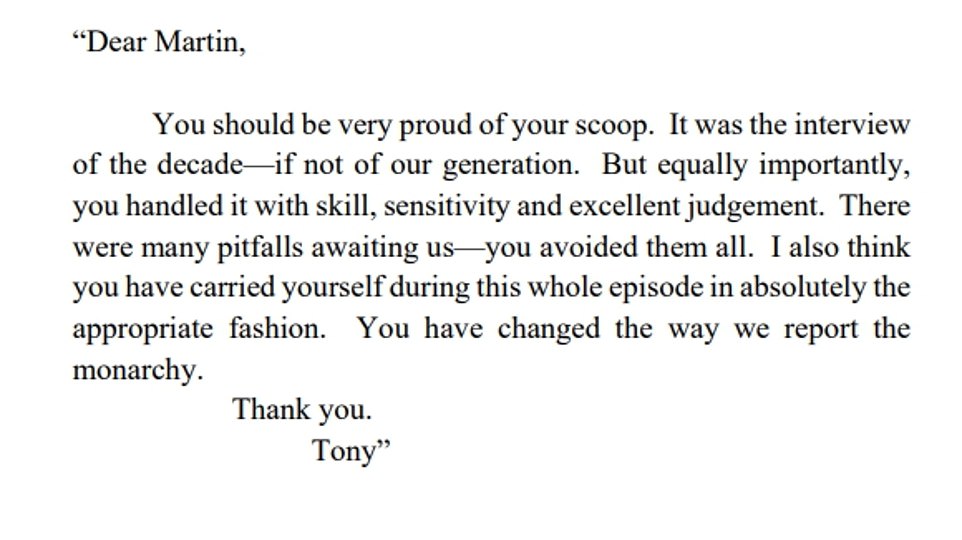
It emerged that Lord Hall had sent Bashir a letter after the Panorama episode in which he said he should be ‘very proud’ for his ‘scoop’
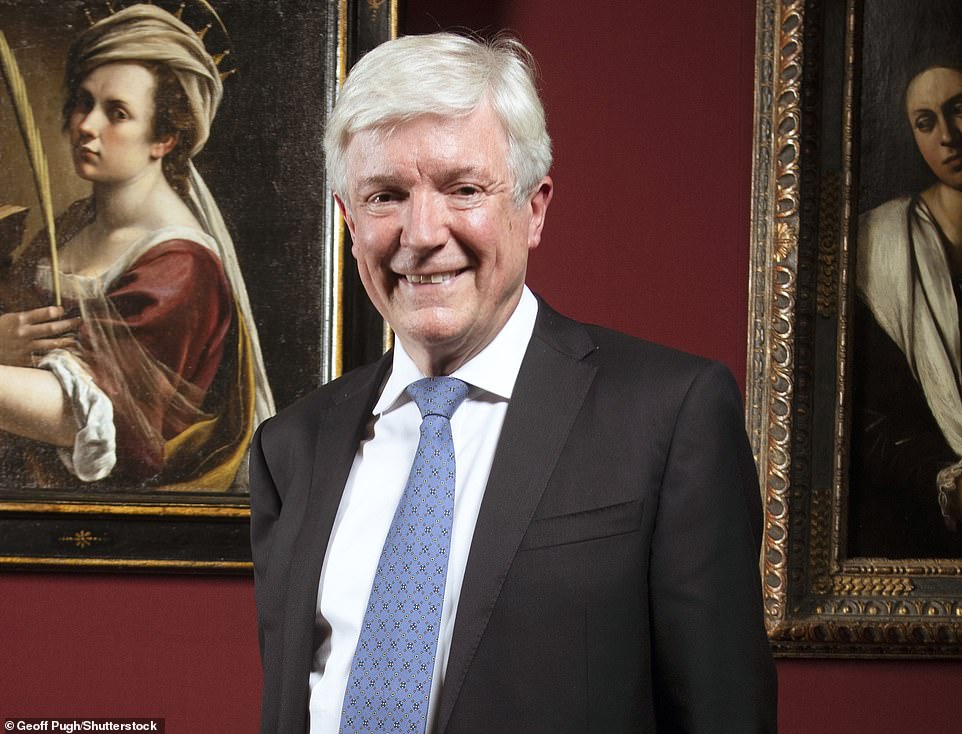
Lord Hall of Birkenhead, 70, is chairman of the National Gallery (where he is pictured last year)
‘Queen eats for comfort, Edward has AIDS, Camilla is depressed, Charles is in love with the Nanny’: How Earl Spencer’s scribbled notes from first meeting between Princess Diana and Martin Bashir became key evidence in Panorama probe
A jaw-dropping list of smears and lies allegedly peddled by Martin Bashir to clinch his sensational Princess Diana scoop was recorded by her brother – including the Queen ‘eating for comfort’ and Charles being in love with the family nanny.
Earl Spencer kept meticulous notes of a meeting held on September 19, 1995, when he introduced the BBC man to his sister at her Knightsbridge flat.
Earl Spencer’s records show that Bashir allegedly claimed that Diana’s private letters were being opened, her car tracked and phoned tapped with her bodyguard plotting against her, and close friends were betraying her.
Earl Spencer’s handwritten log of the meeting with Bashir at his sister’s flat in Knightsbridge also includes a note saying: ‘Camilla: depressed, but quiet for time being’.
In an execrable reference to Prince Edward, Spencer recorded Bashir as saying that the Queen’s youngest son was receiving treatment for Aids at the Royal Marsden Hospital in London. Even the Queen was mentioned. Spencer noted Bashir as saying she was ‘very ill with heart problems’ and that she was a ‘comfort eater’.
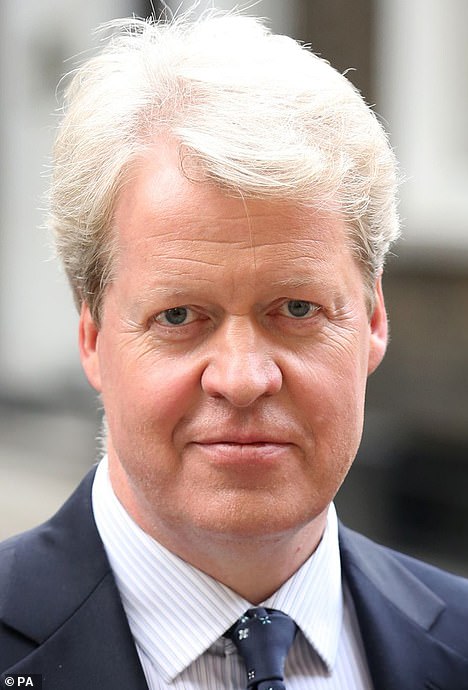
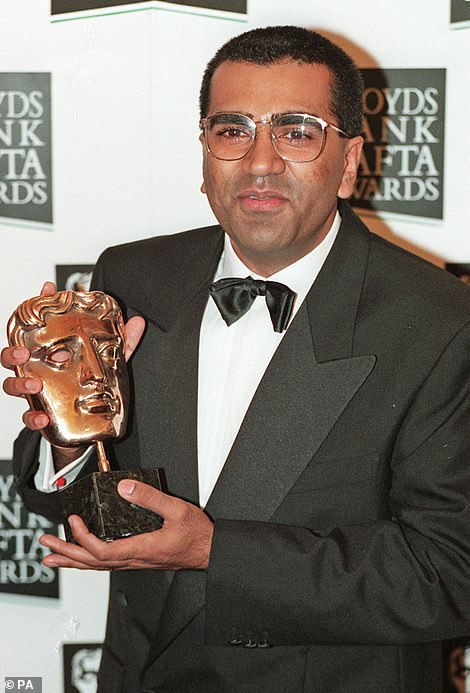
Earl Spencer (left) kept detailed notes when he met Martin Bashir (seen right holding a Bafta award for his Diana interview) when he met the BBC journalist with Diana at his sister’s flat
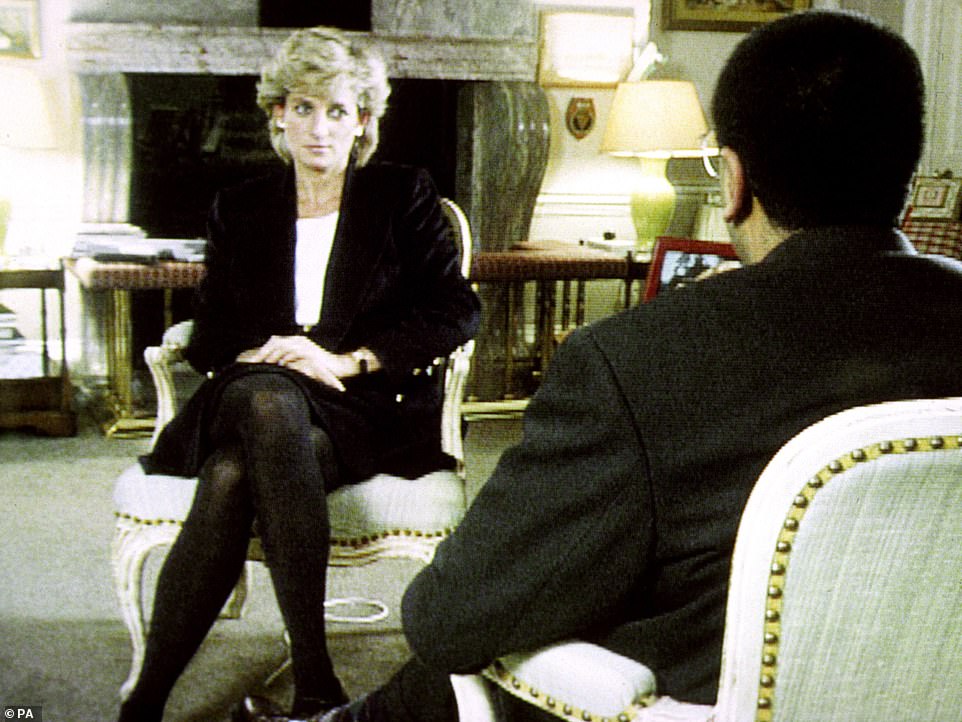
Bashir is accused of effectively grooming the vulnerable princess by playing to her worst fears. Pictured is a still from the 1995 interview
From officials bugging Diana’s car to warnings her reputation would be ‘destroyed’: Earl Spencer’s handwritten scraps that could shred Bashir’s career
1: Diana’s ‘scum’ former bodyguard
Bashir’s opening gambit that three MI6 agents had told him Prince Charles’s private secretary Richard Aylard was ‘orchestrating’ things surrounding Diana. This involved Ken Wharfe, Diana’s former bodyguard, described as ‘scum’.
Diana was already paranoid her staff and friends were betraying her and, at the meeting, the broadcaster allegedly brandished bank statements purportedly showing her closest aides were selling her secrets.
2: Charles’ secretary ‘paid by Jonathan Dimbleby’
Aylard, it was claimed, had been paid by the broadcaster Jonathan Dimbleby. A decision to reinvent the prince had been taken by aides two years earlier. A year later this allegedly included attacking both Diana and the Spencer family.
3: Charles ‘discussing ”end game”’
The notes, handed to Lord Dyson, include allegations MI6 had recorded Prince Charles and his private secretary planning the ‘end game’ – an extraordinary and false hint the heir to the throne was plotting to ‘destroy’ the Spencers and force them to flee to the US.
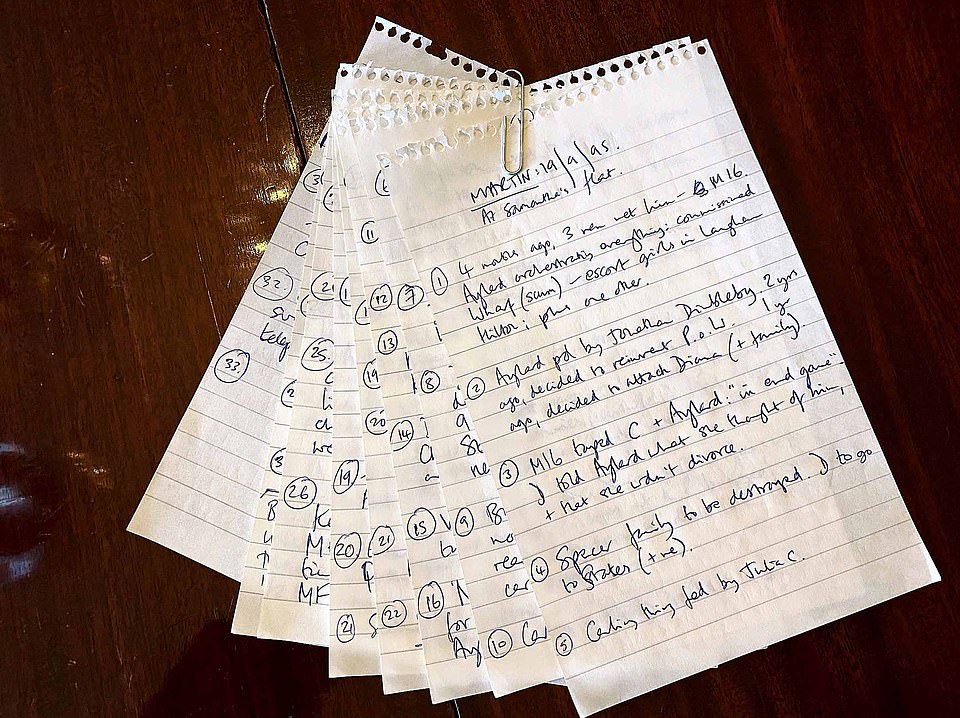
Charles Spencer’s detailed notes, from one to five. The manila file contains notes of every meeting he had with Bashir, the logs of phone calls the BBC man made along with the faxes, the letters and even the gushing thank you cards that the reporter sent him
4: Spencers’ reputation ‘would be destroyed’
Spencers’ reputation to be destroyed. In another remark recorded by Earl Spencer, Bashir claimed Prince Charles wanted Spencer’s then wife, Victoria, dead. Diana meanwhile would be forced to move to America — possibly with her brother.
5: Will Carling affair claim
His relates to the stories during 1995 of the close friendship between Diana and the married England rugby captain Will Carling. Spencer notes Bashir’s assertion that the newspaper stories had been ‘fed’ by Carling’s wife Julia.
9: Diana’s car ‘bugged’

This note describes Bashir’s alleged claim that Diana had been bugged by officials
The claim that Diana’s cars and phone lines being bugged and her post intercepted would have increased her worries she was being spied on.
Bashir told Lord Dyson he would not have made these claims at a first meeting, the Telegraph reported.
17: Camilla ‘depressed’
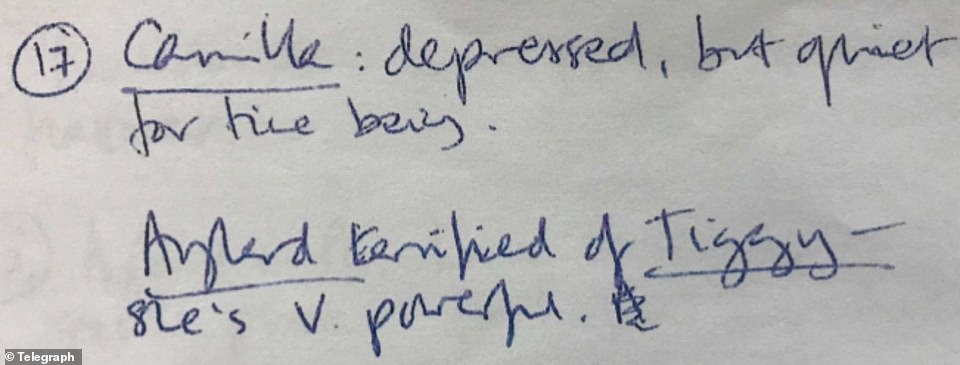
Camilla was allegedly described by Bashir as ‘depressed, but quiet for the time being’. The second line refers to William and Harry’s nanny, Tiggy Legge-Bourke
In the interview, Diana made her feelings clear on Camilla, famously saying, ‘There are three of us in this marriage.’
Mentioning her could have been an attempt by Bashir to prompt her to speak out.
‘Tiggy’ is a reference to Tiggy Legge-Bourke, William and Harry’s nanny who Charles was accused of having an affair with in claims that were subsequently dismissed.
17b: Philip’s ‘v unpleasant correspondence’
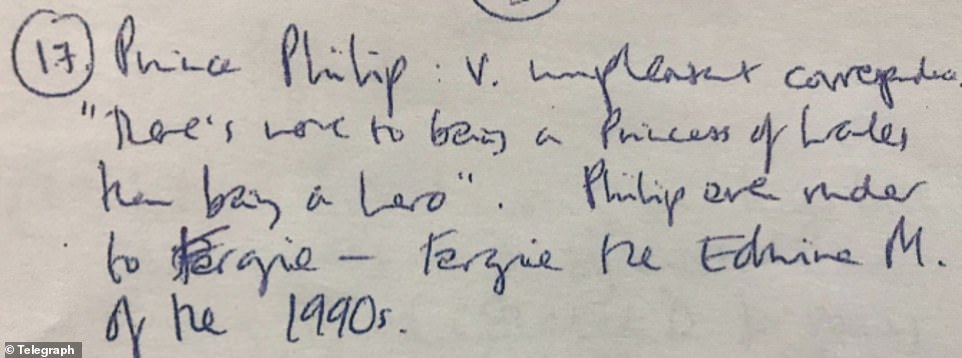
Earl Spencer recorded Bashir as describing ‘very unpleasant correspondence’ allegedly sent by Prince Philip to Diana and Sarah Ferguson
This claims Diana had received ‘v unpleasant correspondence’ from Philip and suggests he was annoyed at her ‘hero status’.
It also references Edwina Mountbatten, the wife of Earl Mountbatten of Burma, who was known to have had affairs.
19: Fergie’s business deals in the US

Another reference to Sarah Ferguson, this time describing her trips to the US to try and forge a business career
Sarah Ferguson and Prince Andrew divorced in 1996. This note refers to her numerous trips to the US to forge a business career.
It adds that Andrew still ‘look[ed] after her’ following their divorce by supporting her financially.
20: ‘Queen eats for comfort’
This note suggests the Queen was unwell, stating ‘Queen ill: heart’ and adds she ‘eats for comfort’.

